Tuesday, July 31, 2018
The best email provider of 2018
Worldwide AI investment to top $200bn by 2025
AI is set to become a multi-billion dollar industry over the next decade as it establishes itself as a common sight in businesses across the world.
A new KPMG report estimates that investment in AI, along with machine learning and robotic process automation (RPA) technology, is set to reach $232bn by 2025.
This is a significant increase from the $12.4bn spent today as more and more organisations adopt AI in their business.
AI growth
The report was accompanied by a survey that looked to gather expectations among business leaders about the effect AI could have on their business.
KPMG found that 40 per cent of industry leaders said they would be increasing AI investment by 20 per cent or more in the next few years
32 per cent added that they would be upping investment in RPA by 20 per cent or more.
However many businesses revealed they were unsure about the impact of AI and didn't feel prepared for how it would affect employees, with recent press coverage concerning how AI could cost millions of jobs a major influence.
"Many traditional businesses with legacy approaches risk falling behind digital-first companies if they stay with the status quo," said Cliff Justice, KPMG partner, innovation & enterprise solutions.
"It takes a comprehensive transformation of business and operating models to compete in their own market at the level at which a Tesla or Amazon do in theirs."
"A lot of change has to happen that’s really uncomfortable and sometimes political, and most companies are not prepared for that."
from TechRadar - Internet news https://ift.tt/2M5IZRR
via IFTTT
The best business broadband deals in 2018
All prices are exclusive of VAT
When you're looking for the best business broadband service, the one you choose is about more than just price. You need fast, reliable internet, with expert support when it matters most.
But when it comes to the price, it's easy to be taken in by promises of market leading tariffs and discounted deals. That's where TechRadar comes in. So that you don't have to waste your time (and, therefore, your money) searching high and low for the cheapest plans, we've put in the hard yards to track down the cheapest business broadband deals in the UK today.
Our comparison chart features some of the most attractive business broadband packages currently available, with our choice of the best at the very top of the chat. With different options depending on whether you want the very fastest fibre optic broadband speeds, or simply the least impact to your bottom line. You can use the filters to narrow down the best broadband for your business.
Best broadband for your business
With businesses chasing every customer online, it's vital for your company to have a broadband service that can deliver the performance you need today, and handle your needs in the future.
Choosing a broadband service for your business may seem like child's play, with these services becoming almost a commodity. However, it is critical to carefully consider the service in use, since this can have a massive impact on performance, and ultimately on the profitability of your company.
Claire Sadler, head of marketing at BT Broadband's business division, advises: "Traditionally business-grade services are slightly more expensive, but that's because they include things such as greater levels of support - both during and outside of normal office hours and guaranteed fix times - as well as more consistent speeds where business traffic gets priority at peak times.
"One other area to look at is whether it includes a free Wi-Fi connection outside of the office, which can enable staff to work effectively wherever they are - whether that's on a laptop, tablet or smartphone."
For business users of broadband services the service level agreement (SLA) is all-important, because the SLA governs how the broadband service will be supported. Richard Phillips, managing director of CUP Classic Cars, says: "As with anything these days, you need to do your homework and know what you need.
"Choose a reputable supplier that really understands your requirements and works with your business needs, so they can give you advice on the best service for you. You have to be comfortable with your supplier and know that problems are going to be resolved quickly should anything go wrong."
Need for more than just speed
Buying broadband services is more complex than simply choosing the fastest speed. Business broadband services also mean data management, backup and recovery, and of course email. Look closely at any services on your shortlist and ensure that they are not consumer grade, and are built with business users in mind.
Cost of course is a clear driver here but the devil is in the detail, as Andrew Ferguson, editor at thinkbroadband.com, says: "A good business connection should come with clear information on what speeds you can expect. So while cheap services will use the classic 'up to' marketing phrase, those services aimed at the business sector should talk about things like committed rate and burst speed. Do not be afraid to ask for explanation, though be wary of sales staff who trot out the line 'our consumer services are 50:1 contention and business is 20:1'... this sales person's patter is eight years out of date."
No discussion of business broadband would be complete without considering the impact that the cloud is now having. Small business users can clearly see the advantages that cloud-based services can offer. What is also vital is the connection that is available to the cloud, which is where a reliable, fast and robust broadband connection becomes essential.
David Barker, technical director of 4D Data Centres, says: "SMBs need to make a decision on what their immediate requirements are to meet the business's needs. Usually for a first connection this is a small office or sole trader, so a basic business ADSL line will suffice. But, if you are looking to grow your staff quickly or if you're planning on using cloud services for your day-to-day activities, then you might want to look at a faster connection such as fibre to the cabinet (FTTC) or even a leased line which can offer speeds from 10Mbps to 1Gbps and is usually able to scale the speed as your business grows."
Top tips for business broadband buyers
To ensure your business chooses the right broadband service for its needs, use the checklist below to help you define your needs, and then locate a broadband supplier that can become a trusted business partner:
1. Perform a data audit
Before choosing a broadband service, look at how your business uses the data it is creating, storing and analysing. This will give you a benchmark to use that will ensure the broadband service has the capacity to handle these data loads. Is your LAN or WAN set up to handle high speed broadband?
2. Connect to the backbone
Your internet service provider (ISP) can be connected to the internet in one of three ways. These are referred to as tiers 1, 2 and 3. Look for a host that has a tier 1 connection, since this means they have their own portion of the internet that they control. These are the most expensive, but the most reliable.
3. Look for better bandwidth
The speed and efficiency of your website depends on how much data your server can send and receive. This is the bandwidth. Look for a hosting service that has bandwidth utilisation of below 50% to avoid bottlenecks.
4. Study service level agreements (SLAs)
Any hosting service worth their salt should offer you one of these. Look closely at every clause so you don't get any nasty surprises. Most items should be open for negotiation.
5. Seek cloud optimisation
As small businesses increasingly use cloud-based services, look for a broadband supplier that is set up to manage a hybrid cloud storage approach to data management, so your small business can use on-site servers and cloud services together.
6. Embrace data services
As more businesses embrace the cloud and the flexibility that this offers for teleconferencing, VPNs (Virtual Private Network), VoIP (Voice over Internet Protocol) and support so you can bring your own device (BYOD), choosing the right broadband service is more important than ever.
Phillips adds: "Don't think in the short term. Technology is changing so rapidly and now enables businesses to do all sorts of things that were unimaginable even five years ago - the internet is at the heart of that change. There is a wide range of options, but as with all things you need to buy the best you can afford, as you'll soon grow into the capacity, whether or not you think you currently need it."
from TechRadar - Internet news https://ift.tt/2r0DM7q
via IFTTT
Google Calendar now gives guests the power to suggest a new meeting time
Having proven itself an invaluable tool for the scheduling of group meetings, Google Calendar has now made itself even more useful by introducing a new feature that promises to make appointment organizing more convenient for everyone involved.
Starting today for web users and available for mobile from August 13, Google has announced that invited meeting guests will now be able to propose an alternate meeting time along with an optional message, which the organizer can then review and approve at their leisure.
Users who've been invited to a Calendar event will now be presented with the option to 'Propose a new time' instead of choosing 'Yes', 'No' or 'Maybe'.
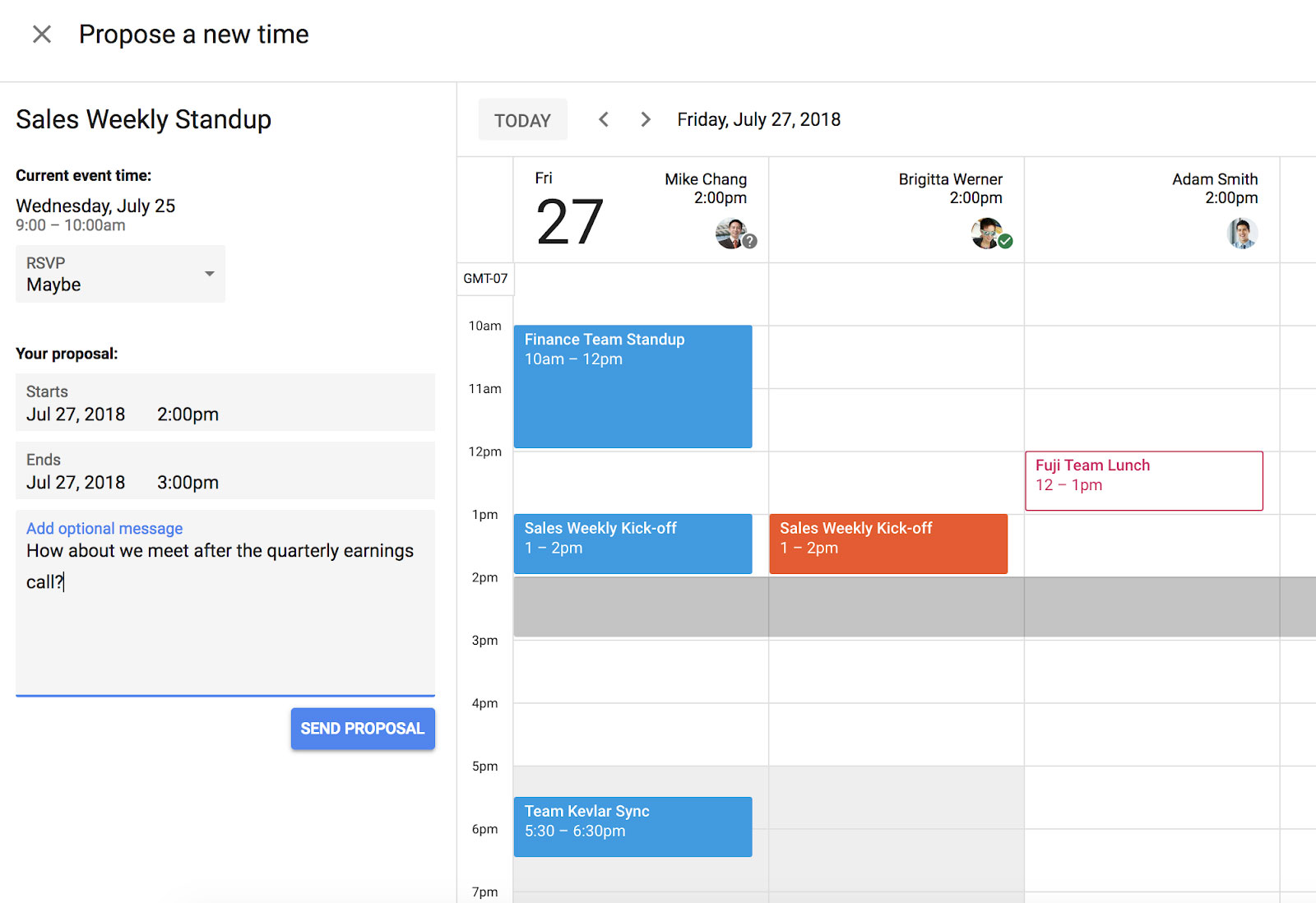
Depending on the organizer's chosen Calendar permissions, guests will be able to see the availability of other attendees, allowing them to pick a time that's right for all parties.
According to the search giant's blog post, the new feature “allows for richer communication between attendees, reduces time spent on meeting practicalities, and makes meetings more productive with key stakeholders in attendance.”
Available to all G Suite editions, the new feature is said to work across domains and will also allow Microsoft Exchange users to send and receive proposals.
from TechRadar - Internet news https://ift.tt/2Aq1ZJr
via IFTTT
Monday, July 30, 2018
IBM bets big on blockchain app store
IBM has revealed it is teaming up with some of the world's leading banks for an all-new blockchain platform.
The new LedgerConnect platform hopes to help share and spread the use of blockchain services and apps among banking and other financial institutions, as well as speeding up transactions and communication between organisations.
IBM's partners in the new venture include the likes of Barclays and Citigroup, with foreign investment firm CLS providing much of the backbone, with areas such as customer compliance checks, sanctions screening and collateral management among initial services on offer.
Blockchain app store
LedgerConnect is a distributed ledger technology (DLT) platform that will host blockchain-powered services on a centralised location - helping drive down the cost of adopting and deploying new tools using the technology.
IBM says that by hosting these services on a single, enterprise-grade network, organisations will be able to focus on business objectives rather than application development, "enabling them to realize operational efficiencies and cost savings across asset classes."
"Together IBM and CLS have been early pioneers in advancing blockchain solutions for the financial services space," said Marie Wieck, general manager, IBM Blockchain.
"Building on the success of CLSNet and leveraging the strong relationship CLS has with the world's leading financial institutions, LedgerConnect is uniquely positioned as a blockchain marketplace for the financial services industry, which will accelerate innovation across the ecosystem with value added services for blockchain networks."
from TechRadar - Internet news https://ift.tt/2LPe6UT
via IFTTT
The best cloud storage of 2018
It's pretty clear that people and businesses will continue the trend of reducing their need to rely on costly hardware and infrastructure by placing files and applications in the cloud.
Given the multitude of cloud storage providers out there, you must take care in choosing a provider who will offer the maximum amount of low-cost storage and bandwidth, while still keeping your data safe.
This list represents our top 10 picks for cloud storage. All offer a free tier allowing you to see if they're right for you before handing over any hard-earned cash.
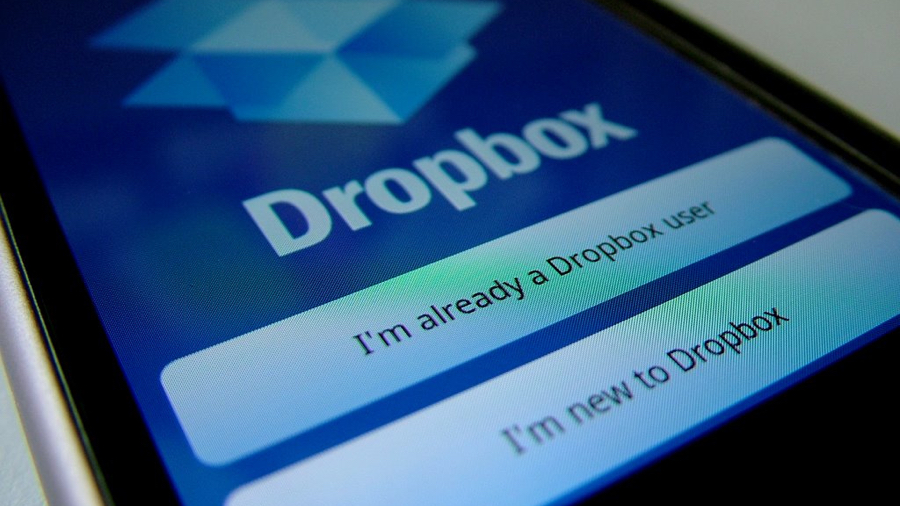
The Granddaddy of cloud storage, Dropbox offers a rather measly 2GB of free storage, but this can be increased up to 16GB free of charge by linking your Dropbox to social media and referring friends to join the service.
Dropbox Business subscriptions allow users to collaborate on work as well as giving each person unlimited space in a personal Dropbox account. There are also enhanced features for file recovery and versioning, and an add-on for Gmail. Business pricing starts from around $12.50 per user per month (£10, around AU$16.50), or you can give it a go for free with a 30-day trial.
Price: 2GB free. 1TB for $10 a month (£6.58, around AU$11) with Dropbox Plus or 1TB for $19.99 a month (£15, around AU$27) with Dropbox Professional, which has some added extras.

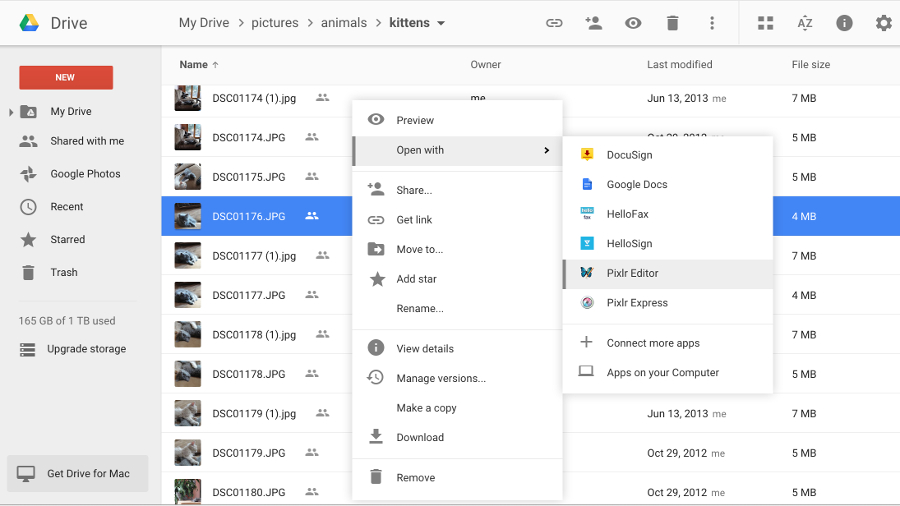
Google Drive is a natural choice for owners of Android devices as it's already integrated, but users of other platforms may appreciate the generous free storage too. You can also store high definition photos on your mobile phone with companion app Google Photos, and make use of Google's own office suite (now known as G Suite).
Downsides include the fact that the web interface isn't very easy-to-use, although Windows and Mac users can download a desktop app to drag-and-drop files easily.
Price: 15GB free. 100GB for $1.99 a month (£1.59, around AU$2.50). 1TB for $9.99 a month (£8, around AU$13). 10TB for $99.99 a month (£74, around AU$130).

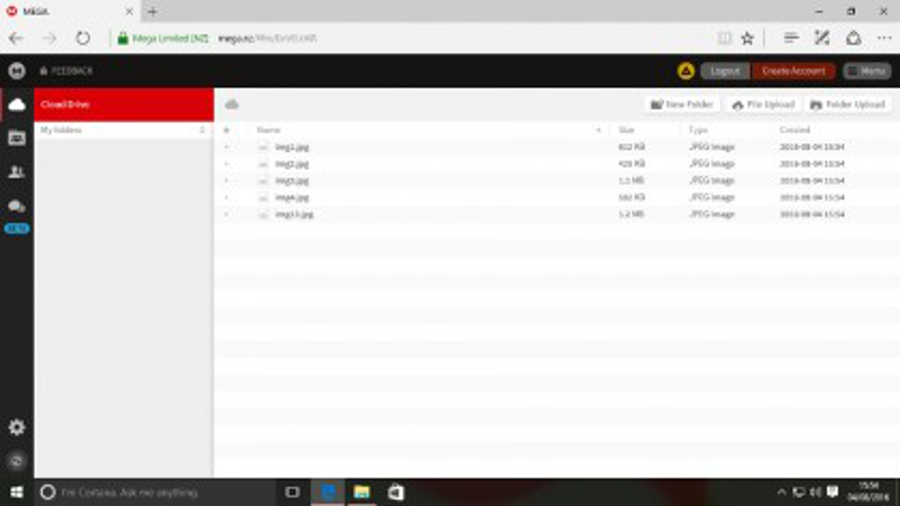
With an insanely generous free tier and a simple drag-and-drop interface, New Zealand-based Mega is one of the cloud storage heavyweights. There's a handy mobile app to allow you to upload files and photos, as well as sync clients with desktop machines.
Mega claims that all data stored in its cloud is encrypted on your device before it reaches the firm’s servers. As the company has released the source code to its sync client, experts can check that there are no vulnerabilities.
Price: 50GB free. 200GB for $6 a month (£4.50, €4.99, around AU$7.50). 1TB for $12 a month (£9, €9.99, around AU$16). 4TB for $23 a month (£17, €19.99, around AU$30). 8TB for $35 a month (£26, €29.99, around AU$46).

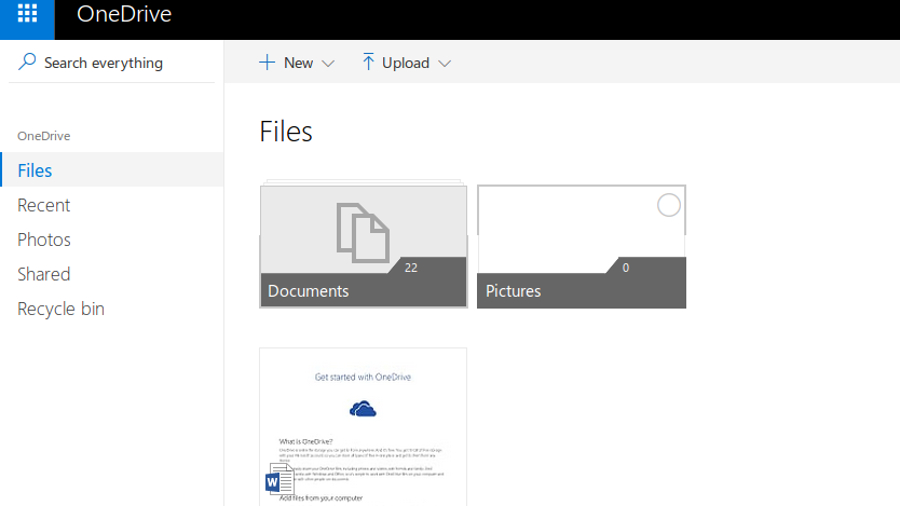
OneDrive (formerly SkyDrive) is integrated into Windows 10's file explorer. You don't have to download an additional app – it's there to use out of the box, which is obviously very convenient for those who have made the jump to Microsoft’s newest operating system.
Microsoft's Photos app can also use OneDrive to sync pictures across all your devices. There's an app for Android and iOS devices, and there's even one in the App Store for Mac users (although it has received mixed reviews).
Price: 5GB free. 50GB for $3 a month (£1.99, around AU$4). 1TB for $8 a month (£5.99, around AU$11). 5TB for $11 a month (£7.99, around AU$14)

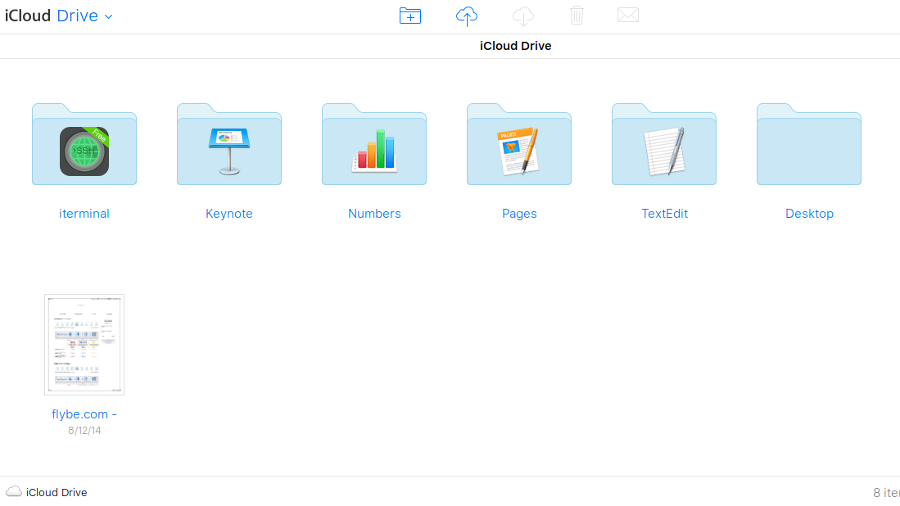
If you want to back up your iPhone to iCloud, you'll need more than the free 5GB allowance Apple gives you, but compared to rivals iCloud prices are very reasonable.
The Mac Finder app integrates iCloud Drive, where you can store any files you wish. Documents created in the iWork office suite are also saved to iCloud and can sync across your devices. Windows users can also sync their files with iCloud Drive using the official client, and access the iWork apps on the iCloud website.
Price: 5GB free. 50GB for $0.99 a month (£0.79, AU$1.49). 200GB for $2.99 (£2.24, AU$4). 2TB for $9.99 (£8, AU$13)


Box's website currently seems to be pushing its Business plans as clicking ‘sign up’ takes you to the pricing page where for $15 per user (£11, around AU$19) you can benefit from advanced collaboration options and unlimited storage. But there is a 10GB free option, too.
As Box has been around for a while, it is supported by a number of mainstream apps such as Google Docs and Office 365. The Box Sync client is available from the Downloads page for Mac and Windows, plus there's also an official Android client.
Price: 10GB free. 100GB for around $10 a month (£7.50, around AU$13)

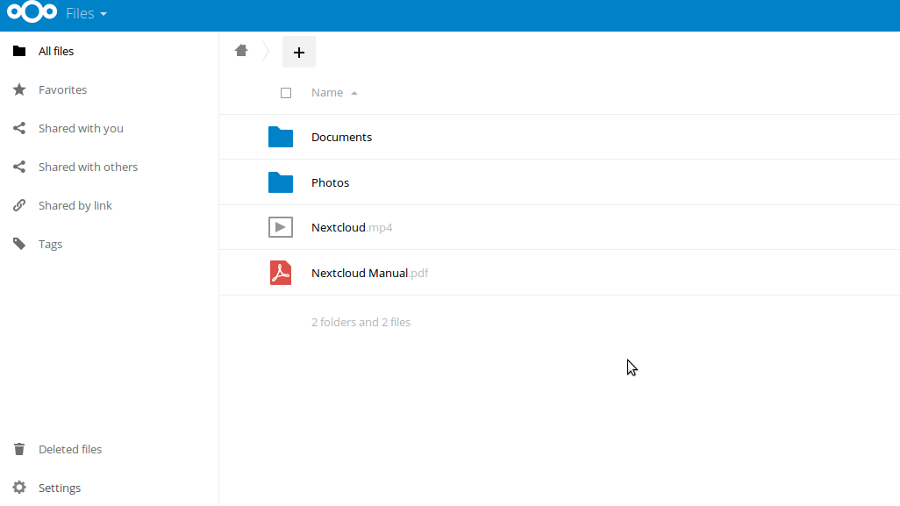
NextCloud isn’t an online cloud storage provider itself, but offers free software to download and install a cloud storage service on your own server. Using a server on your home network for cloud storage is much faster. You can also enable encryption and make sure the information never leaves your home network, which is far safer.
If you've no server or IT experience, you can even purchase a preconfigured NextCloud Box from the website which comes with a 1TB hard drive and will work with an inexpensive Raspberry Pi board to keep your data synced.
Price: Free to install and use. Self-hosting so storage costs vary. NextCloud Box is $79.99 (around £60, around AU$100), although it sold out in most locations, but you might find some on their site.

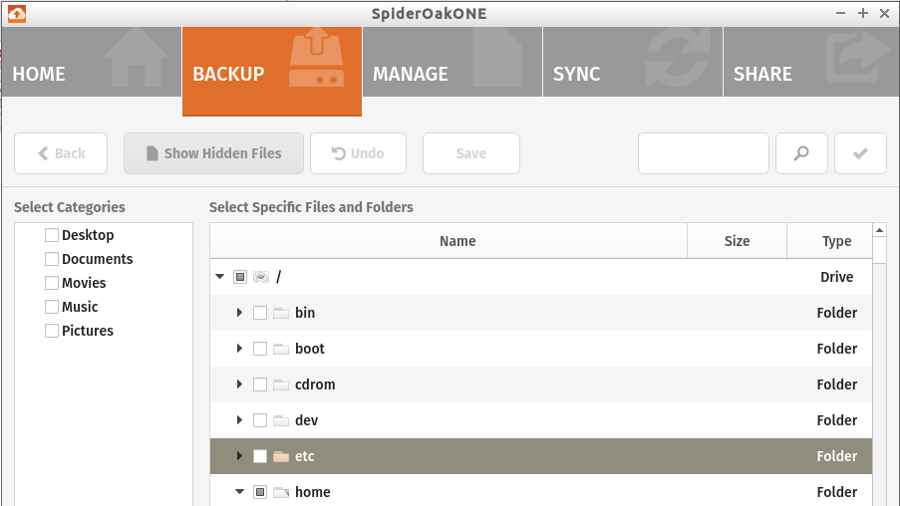
SpiderOak is part of a new trend of zero knowledge cloud storage providers. The website claims that after installing the client your data is encrypted before syncing. Unfortunately since SpiderOak hasn’t made the client source code public, there's no way to confirm this.
The SpiderOakOne client is available for Windows, Mac and Linux as well as Android and iOS (although, both Android and iOS are read-only apps, meaning you can only view files, and can't upload or sync anything). You can also log in via the web interface but privacy lovers may prefer not to as it exposes your password to SpiderOak employees.
Price: 21-day free trial. 150GB for $5 a month (around £3.75, AU$7). 400GB for $9 a month (around £7, AU$11.50). 2TB for $12 a month (around £9, AU$15). 5TB for $25 a month (around £19, AU$33)

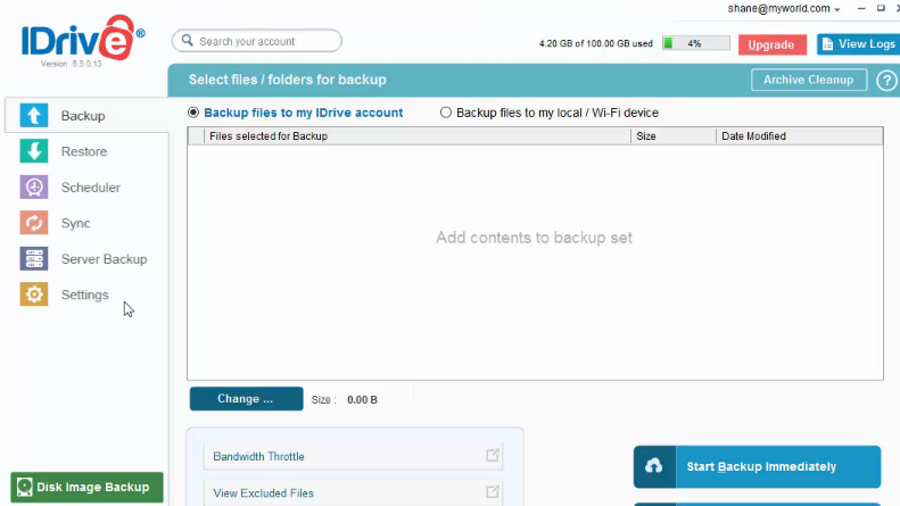
IDrive offers continuous syncing of your files, even those on network drives. The web interface supports sharing files by email, Facebook and Twitter. Cautious or click-happy users will be pleased to hear that files deleted from your computer are not automatically deleted from the server, so there's less danger of removing something important accidentally.
IDrive also offers IDrive Express – a service whereby if you lose all your data they will ship a physical hard drive out to you, allowing for the swift restoration of all your backed up files.
Price: 5GB free. Personal: 2TB for $52 a year (around £40, AU$66). Business: 250GB for $74.62 a year (around £56, AU$98)

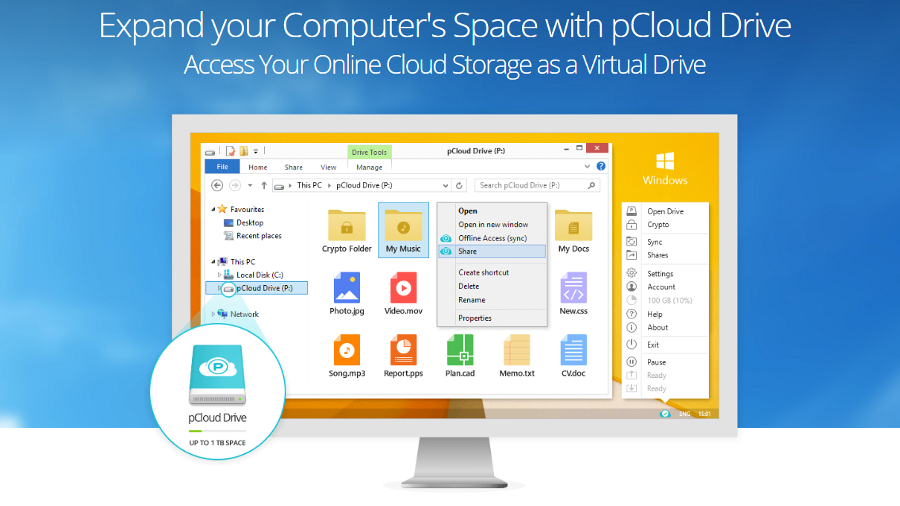
While some bandwidth limits apply, there seems to be no limit to the size of files you can upload, so feel free to sync large media files with pCloud.
The service is available for all desktop and mobile platforms – users can also log in via the website. The company itself is registered in Switzerland which has strong privacy laws, and you can also pay a premium of $4.99 a month (around £3.75, AU$7) for pCloud Crypto to lock (and unlock) individual files with passwords.
Price: Up to 20GB free (You start with 10GB and can increase that by referring people). 500GB for $3.99 a month (around £3, AU$5). 2TB for $7.99 a month (around £6, AU$10). Lifetime plans are also available: 500GB for 175$ (around £131, AU$230). 2TB for 350$ (around £262, AU$460).
from TechRadar - Internet news https://ift.tt/2EKcbeh
via IFTTT
Netflix vs Stan, Foxtel Now and Amazon Prime: Australian streaming services compared
Now that streaming media has become a mainstay in Australian homes, Aussies have plenty of options to choose from when it comes to getting their home entertainment fix.
When combined, Netflix, Stan, Amazon Prime Video and Foxtel Now offer an enormous range of content that can be instantly streamed into your home. However, if you can only afford one subscription service, narrowing down a definitive choice can be harder than it seems.
As each service brings with it a unique range of television shows and movies aimed at different segments of the streaming audience, not to mention differing price points, device compatibility and streaming qualities, we've taken it upon ourselves bring you an in-depth guide to what you can expect from Australia's four major SVOD platforms.
With the constantly evolving nature of each service discussed in this guide, we will endeavour to keep you updated on any significant changes and updates that may occur to these streaming giants in the future.
Here's how the Australian streaming situation stacks up in 2018.
Price
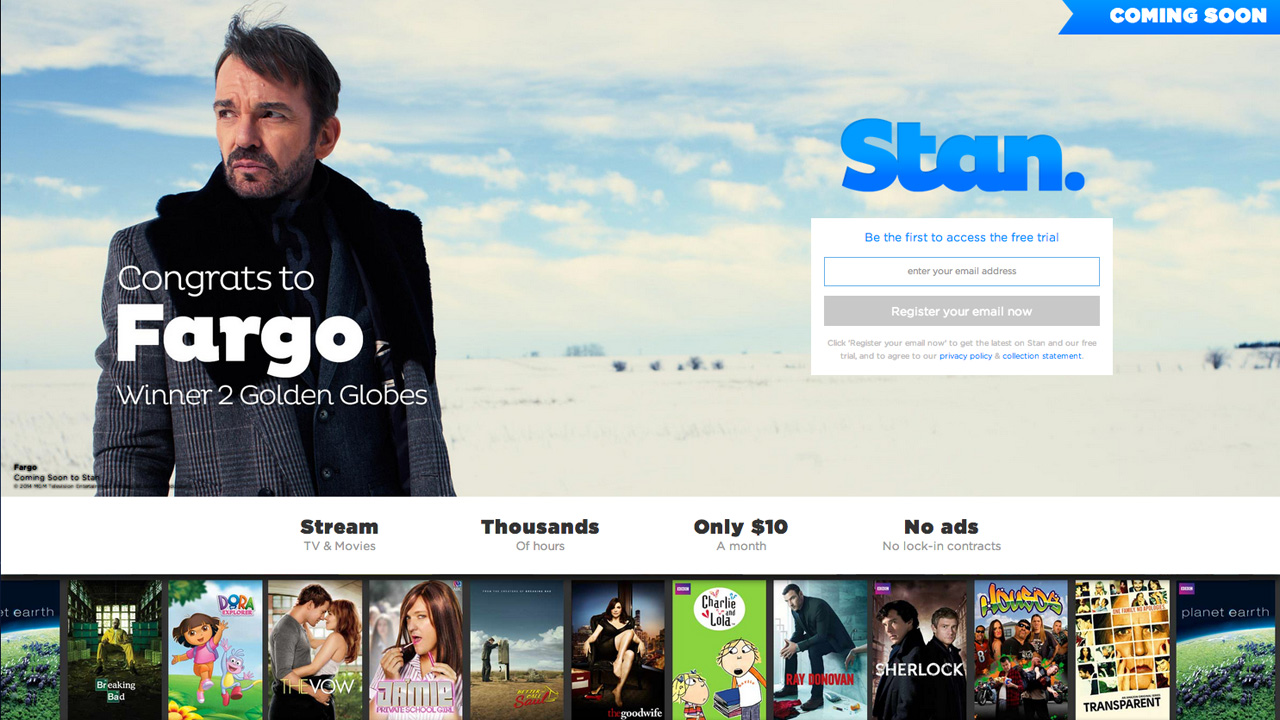
Probably the best thing about having so many streaming options to choose from, is that it forces each service to be priced competitively.
Netflix offers the cheapest stream of the main three, with a single stream in standard definition at $8.99, which, if we're being honest, isn't particularly good value, but may appeal to those who live alone and have a poor quality internet connection.
Thankfully, for $11.99 a month you can get a dual-stream subscription that offers HD streaming quality.
If 4K streams are what you're after, you'll need to subscribe to Netflix's premium package, which costs $14.99 a month and allows you to watch the service on four devices simultaneously. This is probably the most ideal subscription for families with differing tastes in shows and movies.
Though Netflix is obviously working off of how it's priced overseas, Stan has chosen to come out at the low, no-nonsense price of $10 a month. That's for everything the service has to offer at a maximum resolution of 1080p.
If you want to make use of your 4K TV though, you can upgrade to a Premium Stan subscription for $15 a month. So far, Stan has nine of its exclusive shows available to stream at 4K quality, including the likes of Better Call Saul, Breaking Bad, Preacher and Wolf Creek.
These kinds of prices cut straight to the point – once you've tested the service's 30 day trial, you're either on board with forking over a tenner (or an extra fiver) each month, or you're not.
Undercutting Netflix's pricing substantially, Amazon has a special introductory offer that grants new subscribers access to the service for a monthly fee $4.99 for the first six months, after which it will renew at US$6.99 each month after that.
Foxtel Now is different in that it offers a number of different content packs (split into Starter packs and Premium packs) so the user can tailor their subscription to their viewing habits.
The Starter packs kick off at $10 per month, but you'll probably have to sign up to at least a couple of them to get a decent selection of shows overall. Lifestyle, Doco and Kids packages cost $10 each per month, and the Drama and Pop options (both of which offer Game of Thrones) are priced at $15 per month.
Premium packs are where it starts to get pricey, with the Movies pack costing $20 a month and the Sports package costing $29 monthly fee. Both of these packs can only be obtained in addition to a Starter package, meaning your minimum cost for Sports is $39.
Devices
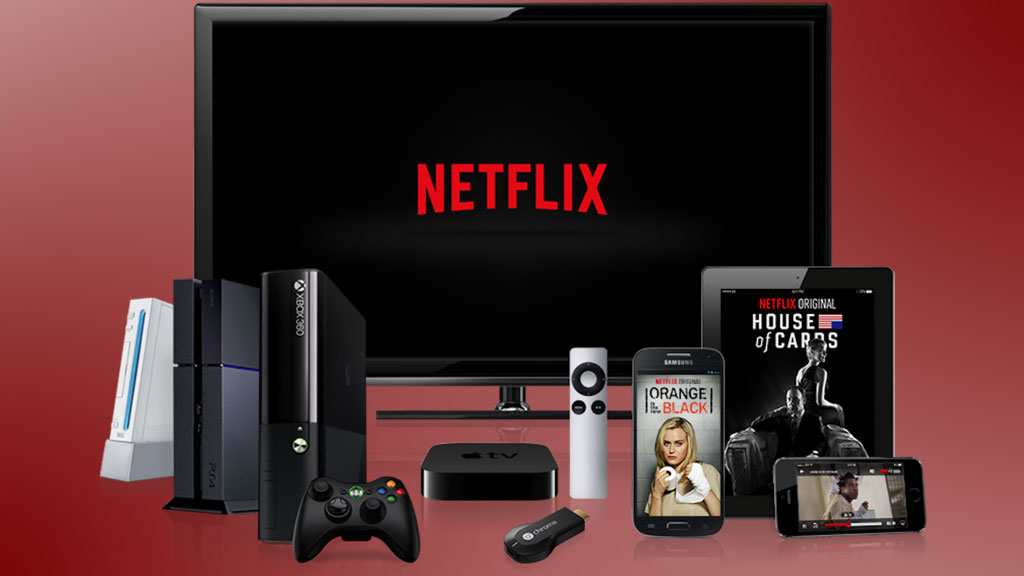
For many people, the decision of which streaming service to sign up for may come down to the devices they own.
Netflix has the biggest global reach and has been around the longest, which is why it can be streamed on the largest number of devices.
The Netflix app is available on a wide range of smart TVs from manufacturers like Samsung, Sony, LG, Panasonic, Philips and Hisense, though you should check your television model to see if the service is supported. Stan is available on all current Samsung smart TVs, Sony smart TVs (running Android TV) and all LG smart TVs running WebOS software.
Stan is also streaming on Hisense smart TVs from 2015 onwards, and we're seeing the app pop up on more and more manufacturers sets. Basically, if you buy a new smart TV locally, chances are that it will play Stan.
At launch, Amazon Prime Video only offered its service in Australia through computer browsers, however, the Amazon Prime app has now appeared on a number of 4K smart TVs, including models from Sony, Samung, LG and more. Before settling on Prime, you should check and see if you smart TV has an app for it.
If your smart TV is of the 4K/UHD variety, chances are that its Netflix app supports 4K streaming. You can also get a 4K Netflix stream for the latest wave of Ultra HD Blu-ray players, such as the Panasonic DMP-UB900 and the Samsung UBD-K8500. Microsoft's newest console, the Xbox One S, also offers 4K playback.
The Apple TV also supports Netflix and has features built around service, such as the ability to use Siri to search for titles by voice, which places Netflix titles appear alongside iTunes listings. A Stan app is also available for Apple TV, but Amazon won't allow its app on Apple TV or Chromecast for business reasons. With that said, you should be able to display Amazon Prime Video on your Apple TV through AirPlay. So far, Siri functionality is only available to Netflix.
Netflix, Stan and Amazon Prime Video are all available on iOS and Android smartphones and tablets, though some older Android models may not be compatible.
When it comes to game consoles, Netflix has the biggest reach, with apps for Xbox 360, Xbox One, Xbox One S, PS3, PS4 and the Nintendo Wii U. Stan has most of the consoles covered but lacks support for Xbox 360 and Wii U.
It's also possible to watch Amazon Prime Video on home gaming consoles, including the Xbox One and PS4, and you can also watch the service using Amazon's Fire TV Stick.
Netflix and Stan are also available on Fetch TV, which is quite handy for the hundreds of thousands of Australians currently subscribed to Fetch.
If you don't have any of the TV-connected devices listed above and still want to watch Netflix and Stan on your television, the two services can also be streamed to a Google Chromecast, which ostensibly provides regular TVs with smart TV functionality (so long as you have a smartphone or tablet to stream from). That said, Amazon Prime Video is not supported on Chromecast.
Foxtel Now works on iOS and Android devices, Chromecast and Chromecast Ultra, PC and Mac and the newly-released Foxtel Now streaming box. Finally, you can also watch Netflix and Stan on the Roku 2-powered Telstra TV media streaming box.
Kids content
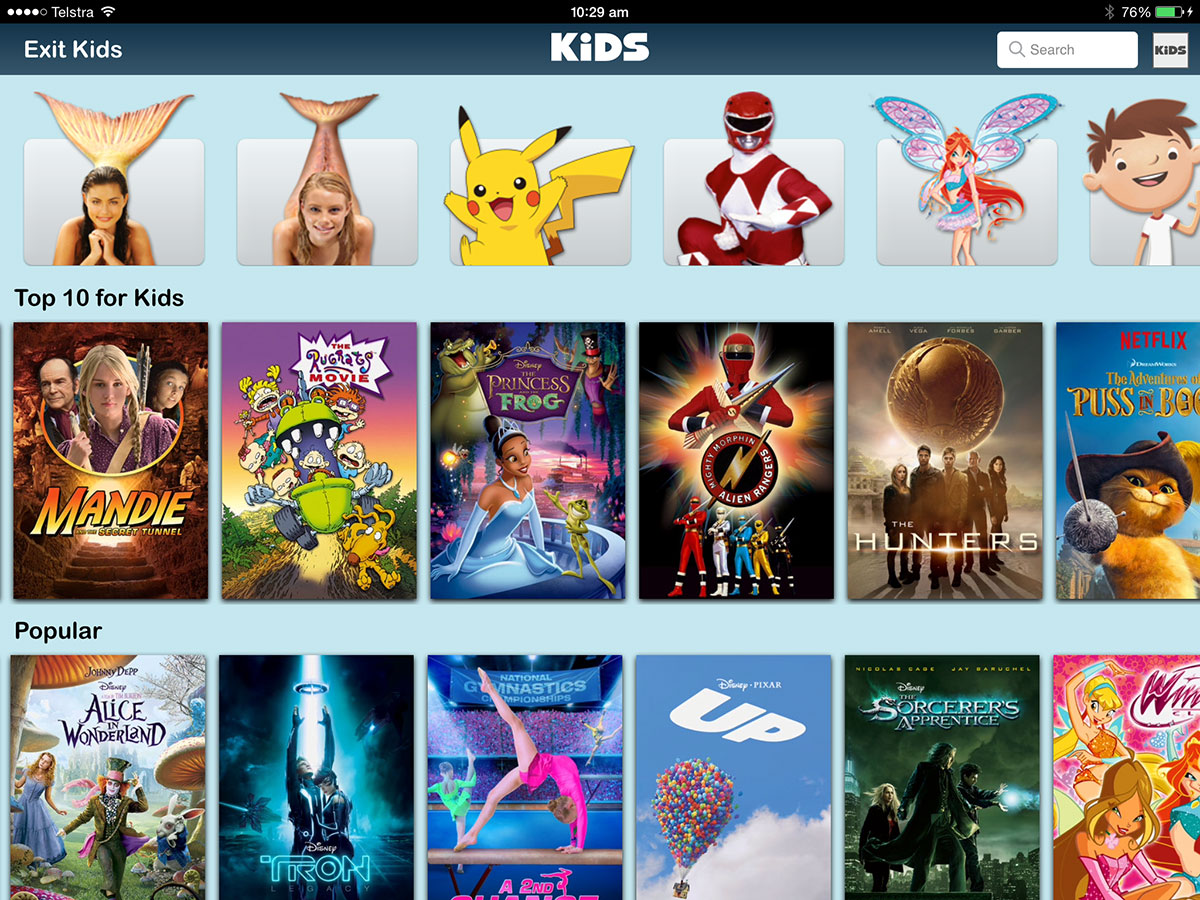
When it comes to kids shows and movies, each service has its own strengths and weaknesses.
Stan has a wide selection of children-friendly shows that mostly stem from its partnerships with Turner Broadcasting (the Cartoon Network), the ABC and Viacom.
Cartoon Network favourites like Adventure Time, Ben 10, Regular Show, The Powerpuff Girls, Cow and Chicken, Generator Rex and Ed, Edd, n Eddy are all ready to stream on Stan.
Likewise, classic ABC titles like The Wiggles, Dorothy the Dinosaur, Guess How Much I Love You and Justine Clarke, as well as overseas titles like Octonauts, Angelina Ballerina, Bob the Builder, Thomas and Friends, Fireman Sam, Sesame Street and Mister Maker are available to stream on the app, and its Viacom deal brings with it a large range of shows from Nickelodeon and Nick Jr, like Avatar: The Last Airbender; Octonauts, Ni Hao, Kai-Lan, Bubble Guppies, and popular live-action shows like iCarly, VICTORiOUS, and Drake & Josh.
Like the rest of Amazon Prime Video's content library, its Kids selection is quite sparse at present. You'll find a number of Amazon Original kids shows you've probably never heard of, like Wishenpoof!, Tumble Leaf and Just Add Magic, alongside some tried-and-true kids movies classics, like The Little Rascals, Casper, Spy Kids and Babe.
Netflix also has a wide-ranging partnership with Walt Disney, bringing with it films and TV shows from Walt Disney Animation Studios, Pixar Animation Studios, Marvel Studios and Lucasfilm.
Animation fans will be happy to know that Netflix has also produced some original shows based on classic DreamWorks properties, including Puss in Boots and How to Train Your Dragon.
Deals with other big children's program distributors Saban, DHX Media and Hasbro Studios have also provided Netflix with numerous incarnations of Power Rangers and My Little Pony.
Special mention should also be given to inclusion of the classic Aussie kid's show, Round the Twist, on both Netflix and Stan's respective catalogues.
Depending on the packages you acquire, Foxtel Now offers plenty of kids shows and channels hosting a large number of Nickelodeon and Disney programs.
TV shows
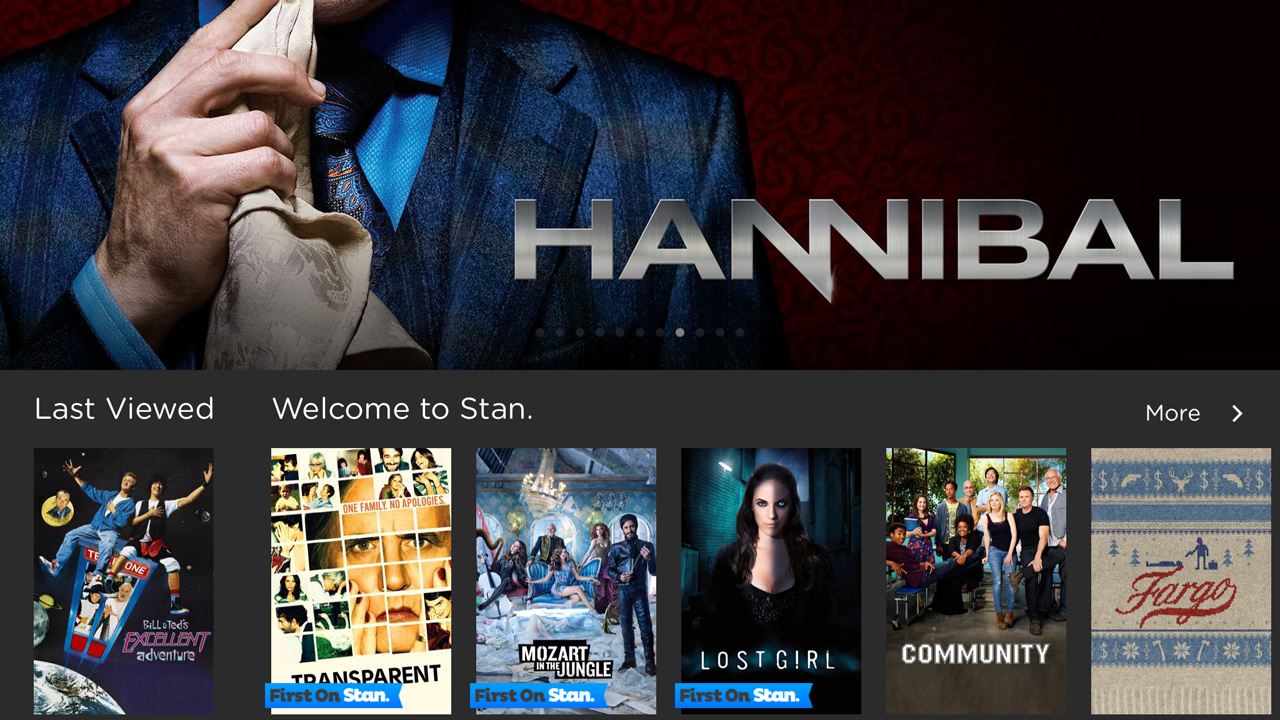
A wide and varied range of television shows are available on Netflix, Stan and Amazon Prime Video, thanks to individual deals between each of the SVOD services and their content partners. Because of this, each service should have something for everyone in your family.
While there's a lot of crossover when it comes to the availability of shows on each platform, perhaps the most important deciding factor comes down to the exclusives and original shows available on each service.
Netflix is without question the leader in this regard, with a large, global slate of original shows that are, for the most part, available in every one of its territories around the world.
The service has achieved huge success with its diverse lineup, which includes award-winning shows House of Cards and Orange is the New Black, long-form superhero shows like Marvel's Daredevil and Jessica Jones, internationally-targeted shows like Narcos, animated sitcoms such as BoJack Horseman and F is For Family, comedies like Fuller House, Unbreakable Kimmy Schmidt and Master of None, and countless stand up comedy specials, to name but a small selection from its rapidly-expanding library.
Though Stan is only available in Australia, it has already begun creating its own original content, having produced the improvised comedy series No Activity, the TV spin-offs of Wolf Creek and Romper Stomper, as well as the comedy series Plonk.
Stan is notable for also having a large range of exclusive shows in its stable, with big hitters like the Twin Peaks revival, Better Call Saul Mozart in the Jungle, Transparent, Power, UnReal, Community, Lost Girl, Dig, Ash vs Evil Dead, Angie Tribeca and 11.22.63 tied to the service for the entire life of each series.
On top of this, Stan is the only service in Australia offering both the complete series' of US sitcom classics Seinfeld and Friends.
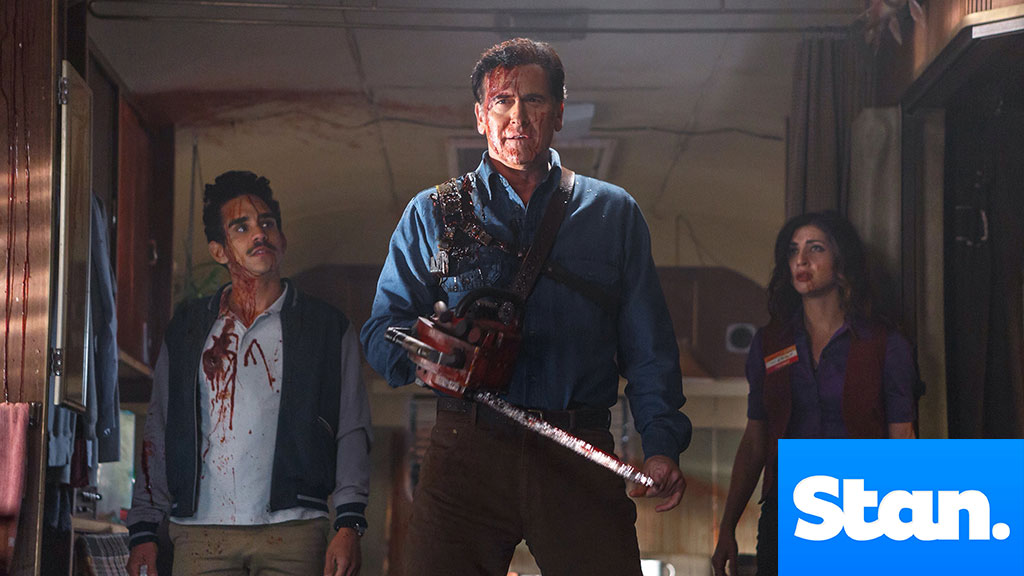
Stan also fast-tracks new episodes of its exclusive shows as soon as they air overseas, a practise that both Netflix and Amazon Prime Video have since adopted with such shows as Riverdale and American Gods.
As the newest service to hit Australian shores, Amazon Prime Video doesn't currently have a huge TV content library on offer, then again, that probably goes a long way to explaining why the subscription price is so cheap.
Most people considering a Prime subscription are probably looking to watch The Grand Tour, the new car enthusiast show from the team behind the beloved series, Top Gear. If that's what you're after, you'll happy to know that every available episode of the series is available on Amazon Prime Video in HDR, with new episodes arriving weekly.
Aside from that, other exclusive draw cards include American Gods, a hyped new show based on the immensely popular Neil Gaiman novel of the same name, Jean-Claude Van Johnson, which stars Jean-Claude Van Damme as a spy version of himself, The Tick, a comedic superhero series revival, The Man in the High Castle, which posits a world in which the Nazis won World War II, and The Terror, a horror anthology series based on a best-selling book.
Unlike the competition, Foxtel Now lets you also watch live television broadcasts, essentially giving you the regular Foxtel experience over the internet. Aside from this, most of the packages on offer, such as Drama and Pop (which have loads of HBO content split across them), are mostly filled with television shows. Fans of reality TV will get a real kick out of the selection here.
Movies
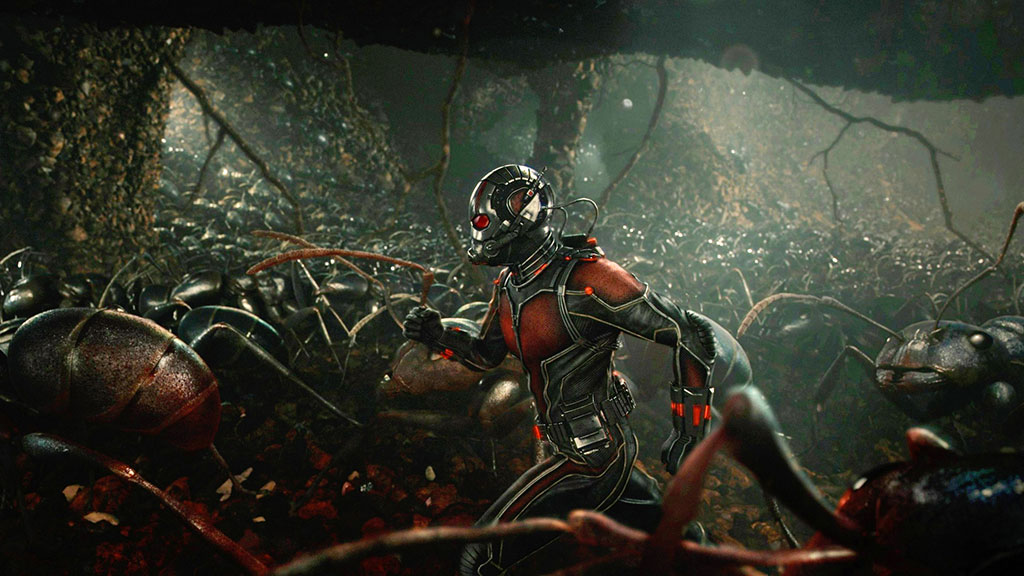
As with most SVOD services, the titles available on Netflix, Stan and Presto change occasionally according to content licensing agreements. That said, each service has a pretty decent collection of films aimed at slightly different audiences.
Despite what people will tell you about Australian Netflix compared to its US version, the local service has a pretty impressive lineup of blockbuster titles which focus on quality over quantity.
Netflix's aforementioned partnership with Disney also extends to movies, with titles such as Marvel's Captain America: Civil War and Ant-Man ready to stream, as well as animated films like Zootopia and Inside Out.
Netflix has also started acquiring and creating its own films under its Netflix Originals banner, with titles like Beasts of No Nation, Ridiculous 6 and Crouching Tiger, Hidden Dragon 2: Sword of Destiny already available to stream.
Amazon Prime Video offers a number of classic older films, including Pulp Fiction, Scarface, Jurassic Park, Scream, Serenity, American Pie and more, though nothing too recent is currently available to stream. Its recent Amazon Original film The Neon Demon, for instance, is currently geo-restricted.
Still, fans of B-grade cinema, including straight-to-video '90s martial arts movies, '80s horror movies and sleazy grindhouse flicks will find plenty to love on Amazon Prime Video. In fact, it blows all of the other services out of the water in this regard, with a rather big selection of these kinds of films.
As was mentioned earlier, you'll need a Movies package to watch feature films through Foxtel Now, though that will set you back $20 per month on top of a $10 Starter pack. Many of the movies are new releases, showing much of the content you'd expect to see on live Foxtel.
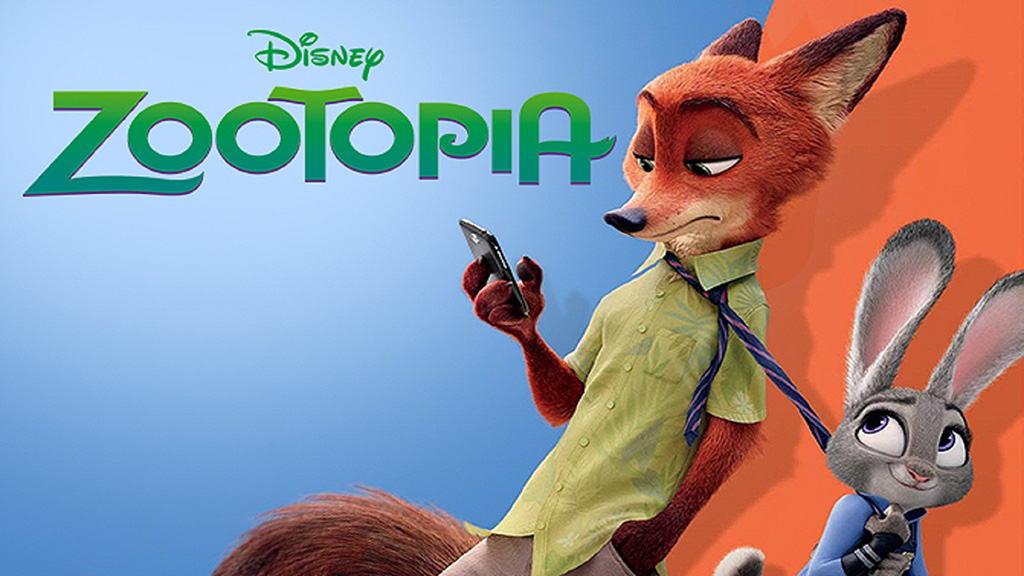
Unfortunately, Stan doesn't provide access to any Disney content at all, which does feel like a pretty big hole in its otherwise impressive lineup.
It does however, provide a big selection of Roadshow Entertainment titles, including huge films like Mad Max: Fury Road, The LEGO Movie, The Hunger Games series, Edge of Tomorrow, The Matrix trilogy, The Lord of the Rings trilogy and more.
A content deal with MGM also provides Stan with a large back catalogue of classic films, including the entire James Bond series (minus the most recent addition, Spectre), The Silence of the Lambs, When Harry Met Sally and a huge selection of Woody Allen films.
While Netflix's movie library is more mainstream in nature, Stan is easily the leading streaming service when it comes to art films and world cinema, with its SBS World Movies partnership providing access to films from over 45 countries in more than 70 languages.
Streaming quality

All three services offer HD streams (unless you're subscribed to Netflix's lowest tier), however, Netflix is unquestionably the leader when it comes to streaming quality, as it offers the most 4K HDR content (top pricing tier only) of any of the services listed here.
Netflix Originals, with some exceptions, are generally available in 4K streaming quality. The service has also started streaming HDR (high-dynamic-range) and Dolby Vision content for many of its original shows and movies.
The service has an adaptive bit rate that adjusts itself based on the quality of your internet connection. It should be noted that, even if you have a blazing fast connection, Netflix will occasionally fail to reach full resolution during primetime hours due to congestion.
Stan also uses adaptive bit rate technology, however it also offers users the ability to select the streaming quality of its shows (where available). The Ultra setting offers full 4K resolution, though you'll need to subscribe to the Premium package to see the benefits of the Ultra HD upgrade.
Unlike its competitors, Stan allows users to select the quality of their streams on smart devices, media devices and smart TVs. Simply select the cog icon and choose between Low, Medium and High quality streams. This is especially handy if you're having buffering problems or if you're streaming off mobile data.
With Netflix adding offline viewing to its subscription price, allowing using to download a selection of shows and movies to their devices for viewing outside of Wi-Fi networks, the service immediately increased its overall value.
Thankfully, Stan has followed suit, and now allows subscribers to download the vast majority of its content. This makes its $10 monthly price point even more of a bargain than it already was.
Amazon Prime Video also offers 4K HDR content, though with the varying quality of the shows and movies on offer, it's a little tricky to know what's available in SD, HD or Ultra HD until you start watching it. Original shows are, for the most part, available in 4K.
Foxtel Now is said to offer HD streams, but the quality is a mixed bag. Often blurry or with overly saturated colours, the picture quality here is a far cry from what Netflix, Stan and Amazon Prime Video are offering. This really changes on a show-by-show basis. Game of Thrones looks pretty clean, though.
Verdict
Though each service has its own strengths and weaknesses, Netflix is unquestionably the winner when it comes to device compatibility, original content and stream quality.
Its library of Netflix Originals continues to grow and maintain a generally high level of quality, with the service producing the kind of content that gives HBO a run for its money when it comes to premium programming.
When you ignore its standard definition pricing option (and we ignore it pretty hard around these parts), Stan's flat $10 subscription fee is definitely more appealing for people who want access to a HD stream, but when you consider how many original shows Netflix produces, a couple of extra bucks a month is hardly a deal-breaker.
It's great that Amazon Prime Video has made its way to Australia, and while it still has a long way to go in terms of growing its content library and list of compatible devices, it continues to add new content constantly, filling out the content selection with a number of gems.
On the plus side, the service is quite inexpensive at the moment, so if you want to try it out for yourself anyway, you can do so without breaking the budget.
We love the sheer amount of content available on Foxtel Now (it really does leave the competition in the dust in this regard), though getting a decent selection up will hurt your wallet in the long run.
Still, when all is said and done, there's no denying that Netflix truly is the king of streaming media in Australia.
from TechRadar - Internet news https://ift.tt/2dwbNl7
via IFTTT
Friday, July 27, 2018
Three technology trends transforming the way we work
The advent and subsequent growth of fast and reliable communication tools (such as Flock and Slack) has changed the dynamics of the way we work on a daily basis. No longer are we tied to an office or a phone line, as today’s teams can work from anywhere. As a result, workers can collaborate more easily and build amazing things faster.
In truth, we are on the verge of an evolutionary shift in the way we work. Technology trends such as CX-first products and services, process automation and a host of AI technologies will lead the charge to unify and simplify enterprise communication, and make workplace collaboration easier and more efficient in the near future.
Here are few predictions:
CX will redefine B2B products and services
Customer experience (CX) has always been vital for any product or service. However, with the proliferation of SaaS businesses, and the importance of arresting customer churn, CX is more important than ever. In short, it will redefine B2B products in the near future.
Products with complicated setup and configuration needs will be shown the door and enterprises will increasingly expect seamless user experiences, regardless of how segmented their user base may be. In other words, simple and easy will be the norm, and complicated and clunky will be out.
Process automation will lead to increased business efficiency
An often overlooked part of any business is its dependency on processes. Functions such as IT, HR and finance, in particular, rely heavily on standard operating procedures (SOPs), which involve a lot of human interaction, data entry and information-routing processes.
Automating these repetitive human tasks and business processes is the next big change in the workplace. Going forward, enterprises will increasingly focus on automating processes such as IT service requests, employee on-boarding, corporate expense reports and approvals, and marketing collateral requests. As a result, these processes will no longer be a hindrance to productivity.
AI will transform, not replace, human resources
The doomsday sentiment seems to be that machines will take over the world. Sadly, for the conspiracy theorists, this is far from true. Artificial intelligence will enable human beings to do more, not replace them.
Over the past decade, AI technologies such as machine learning have helped increase the accuracy of Google searches, image and voice recognition, autocorrect and a lot more. In the workplace, the increased adoption of bots in communication tools (such as Flock, Slack) will help teams do more. This is just the beginning.
There’s no doubt it’s an exciting time to be on the cutting edge of workplace technology. Properly applied workplace collaboration tools can truly reduce redundancy and waste while increasing teamwork and results. Companies need to embrace elements like CX, process automation, and AI and put them to work. That is the way forward, and what I believe we will see in the coming months.
Bhavin Turakhia is founder and CEO of Flock
from TechRadar - Internet news https://ift.tt/2LJiOn5
via IFTTT
Google bans crypto-miners and Disney pregnancy simulators from the Play Store
Google has published an update to its Play Store Developer Policy banning cryptocurrency miners, tutorials for making explosives, and Disney princess childbirth games.
Google blocked cryptocurrency miners from the Chrome Web Store in April, and has now extended that ban to mobile apps. Apps for managing mining remotely are still permitted, though.
The updated Play Store guidelines also bar apps that "appeal to children but have adult themes", which should halt the flow of bizarre games that invite players to perform surgery on cartoon characters.
Google has faced fierce criticism from parents for hosting similarly creepy and inappropriate videos on YouTube, where they're likely to be found by children looking for episodes of their favorite TV shows.
Quality over quantity
Google has cracked down on algorithmically-generated apps that cobble together a strange mixture of keywords to harvest clicks – another problem the Play Store has in common with YouTube.
"Apps that are created by an automated tool, wizard service, or based on templates and submitted to Google Play by the operator of that service on behalf of other persons are not allowed," the company says.
"Such apps are only permissible if they are published by an individually registered developer account belonging to the user of the automated tool, not the operator of the service."
To cut down on 'low quality' apps even further, the new policy bans apps that are nearly identical to ones already published on Google Play – whether they're copies of other creators' content, or several versions of the developer's own work.
"If these apps are each small in content volume, developers should consider creating a single app that aggregates all the content," Google advises.
Via Engadget
from TechRadar - Internet news https://ift.tt/2AgraOG
via IFTTT
Facebook just had its worst week in the company’s history
Despite facing a slew of controversies this year – from the Cambridge Analytica scandal, accusations of spreading violence in some countries, and spreading fake news – Facebook seemed to be on track with sales projections and profit estimates. Until this week.
The social media platform’s second quarter earnings report showed it had lost approximately a million monthly users and 3 million daily users in Europe, with no user growth in the US. According to Facebook CEO Mark Zuckerberg, the implementation of the EU’s General Data Protection Regulation (GDPR) is to be blamed.
"GDPR was an important moment for our industry," Zuckerberg said on Wednesday. "Looking ahead, we will continue to invest heavily in security and privacy. This is our responsibility to keep people safe."
Profit plunge
Facebook’s shareholders and investors began unfriending the social media platform after the company’s chief financial officer, David Wehner, predicted that revenue growth would continue to be slow for a while, sending Facebook share prices plummeting as much as 24%.
The company warned its investors that a huge financial injection would be required to buttress the business to address the controversies it’s currently facing, with revenue growth expected “to decline by high single-digit percentages from prior quarters”.
The drop in share price sent Mark Zuckerberg’s fortune tumbling by US$16.8 billion, which could send him sliding down the Bloomberg Billionaires Index.
Valuable data
While Facebook faces the worst week in the company’s history, it still holds the world’s largest repository of user information. And although the loss of active users in Europe has hit its advertising revenue as well, the company insists the advertising part of its business is still strong
According to the company, Facebook Messenger and WhatsApp show promise as new advertising platforms, although chief operating officer Sheryl Sandberg doesn’t believe they’ll contribute strongly for a few years yet.
Despite Facebook facing the hard truth behind user disenchantment, it still remains a profitable company and we definitely haven’t seen the last of it yet.
from TechRadar - Internet news https://ift.tt/2OlMuFx
via IFTTT
Thursday, July 26, 2018
GDPR: Turning the burden into an opportunity
The world of online data privacy has been active, lately.
If you’re in the European Union right now, you’ve already seen the “Please agree to our Privacy options” pop-ups on every website you open. Your inbox has also been clogged with opt-ins and with “Important – we’re updating our Privacy Policy” emails.
It’s already been a month since all organizations operating in the European Union have been required to comply with the GDPR. The General Data Privacy Regulation, for those who don’t know, is the European Union’s way of making sure companies are transparent with you. Under the new regulation, services are required to disclose what information they collect from users, how they store it and how they process it.
The GDPR covers any data that can be used to identify you as a person, even indirectly. “Personal data” in GDPR terms includes: location data, IP addresses, browser cookies and more.
While essentially, the GDPR might seem unneeded, it is an opportunity to evaluate the services you’re currently using.With cloud storage becoming increasingly popular for personal use, this necessary transparency might help you choose the actually secure cloud storage solution.
Security standards
Under the GDPR, a lot of companies have taken time to re-evaluate their Privacy Policies and include how they handle your personal data. Cloud storage is no exception.
Cloud storage services, who take adequate security measures to protect your personal data from loss, alteration, or unauthorized processing, are the ones you should be looking for. The GDPR has outlined encryption as a good standard for data protection.
This is an opportunity to spend a few minutes and see what kind of data services actually collect and protect, what encryption standards are these companies using and what your Privacy Options are.
Privacy options
Consent lies at the heart of the GDPR. Chapter 3 of the regulation contains a list of your personal data privacy rights, as a user. This includes the right to receiving a notification of a breach, the right of full erasure of data, the ability to restrict the processing of your data and more.
How these preferences are managed and respected by your cloud storage app is another way to evaluate the service you’re using. In most cases, cloud storage and file sync apps are data controllers. They won’t process your files, but rather - your email address, IP address and other things alike. However, the ease with which you can manage your privacy options alone are that can differentiate one app from another.
Customer commitment
In the end, it all comes down to how committed your service is to your satisfaction. Recent studies have shown that 54% of customers have switched to competitors, due to bad customer experience.
Going the extra mile and introducing clear and transparent communication is crucial post-GDPR. Openness builds trust, which in turn increases customer satisfaction. Companies, which are proactive about protecting their users’ personal data,are the ones, who want to build long-term relations.
Stalina Zoir is marketing specialist, pCloud
from TechRadar - Internet news https://ift.tt/2Lt3N9C
via IFTTT
What is blockchain? Everything you need to know
What is blockchain?
Like much of the technology world, cryptocurrencies such as Bitcoin still rely on some form of database that are able to track large volumes of transactions and keep them secure. The solution used by many of the world’s largest digital currencies is the blockchain.
First implemented in 2009, the technology consists of 'blocks' that hold batches of timestamped transactions, with each block linked to the previous one through cryptography, thus forming a chain.
As the world becomes ever more smarter and inter-connected, cryptocurrencies have become an increasingly attractive proposition for growing markets that may not have traditional banking infrastructure. Several developing third-world nations have implemented blockchain-based national currencies, and the technology is also used by several major charity projects to help those without bank accounts.
However blockchain also offers the possibility of creating a fraud-proof system for transacting exchanges. This therefore gives it huge potential for use outside of the digital currency sphere, helping attract interest not just among traditional financial institutions, but in areas as diverse as manufacturing, food production and many more.

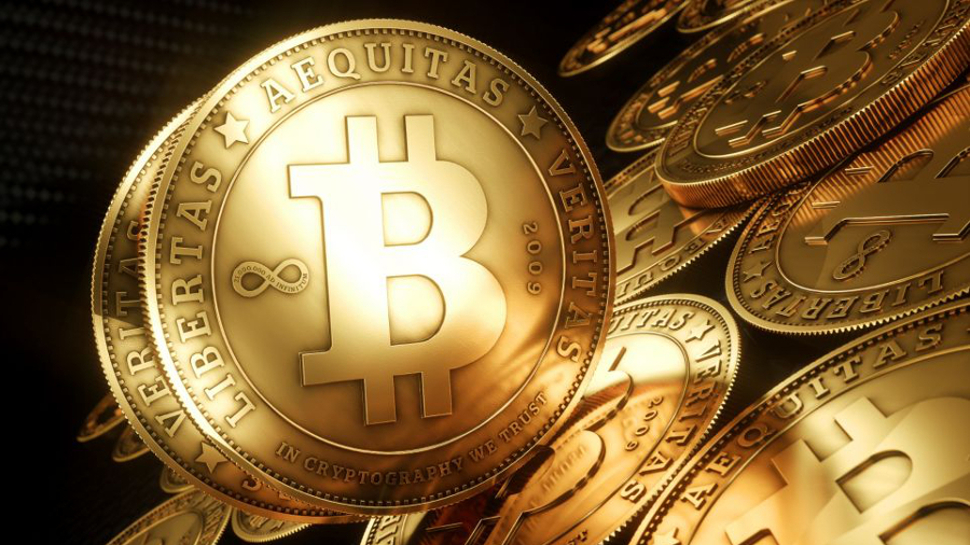
Blockchain - the latest news
25/07 - Blockchain company Tron buys BitTorrent - File sharers can rest easy...
24/07 - Google bets on blockchain for cloud - Google Cloud Platform now supports key backbone of blockchain technology...
18/07 - Mastercard targets major blockchain breakthrough - Card provider looks to patent technology aimed at making blockchain payments simpler and faster...
12/07 - Finney is the world's first $1,000 blockchain phone - Blockchain-powered Finney phone revealed by Sirin Labs ahead of launch...
11/07 - HTC Exodus: everything you need to know about the blockchain phone - HTC is launching a blockchain-powered phone, here's all the top facts...
10/07 - HTC reveals more on its blockchain phone - HTC Exodus will get early access later this year...
04/07 - MP calls for UK government to get behind blockchain - Eddie Hughes MP urges government to appoint Chief Blockchain Officer to gain support...
25/06 - Microsoft is re-launching its blockchain - Teaming up with banking giant EY to make blockchain a force for good...
18/06 - What is Hdac? The World Cup blockchain advert, decoded - We take a closer look at the World Cup’s most technology-friendly advert...
11/06 - UK could be set for first blockchain listing - London Stock Exchange listing could be a UK blockchain first
06/06 - The role of blockchain in GDPR compliance - Can blockchain be the key to helping your business conquer GDPR?
31/05 - GDPR compliance and Blockchain - How are two of the biggest technology issues of today linked?
29/05 - Blockchain could revolutionise retail: Deloitte - Deloitte report claims major changes could be made using blockchain...
23/05 - American Express: Why blockchain could save help save you from fraud - American Express technology head hints at more blockchain to come from the card provider...
16/05 - HTC is making a blockchain smartphone - HTC Exodus will feature beefed-up security protection designed for blockchain transactions...
14/05 - HSBC marks major blockchain landmark - World-first transaction using blockchain marks a crucial step forward...
09/05 - Facebook launches new blockchain team - Blockchain team will be led by former Facebook Messenger head David Marcus...
08/05 - Report urges caution on the benefits of blockchain - Vast majority of companies reportedly still have no strategy when it comes to blockchain...
15/03 - Blockchain can 'speed up' payment settlement between telcos - Colt and PCCW hold trial of Blockchain for wholesale voice call payments...
06/02 - The best Bitcoin exchange of 2018 - It’s all about reputation, currency support and transaction fees...
27/01 - Here are 5 markets that blockchain will transform beyond recognition - From credit cards to loyalty schemes...
18/01 - 7 ways blockchain will change the legal industry forever - From smart contracts to the chain of custody...
17/01 - 6 things that prevent Blockchain from ruling the world - From energy wastage issues to worries about bulkiness...
16/01 - Here are the 10 sectors that blockchain will disrupt forever - From the obvious like banking, to the not-so-obvious…
26/08/2017 - Microsoft is making a blockchain that’s fit for business - Coco Framework aims to remove persistent stumbling blocks...
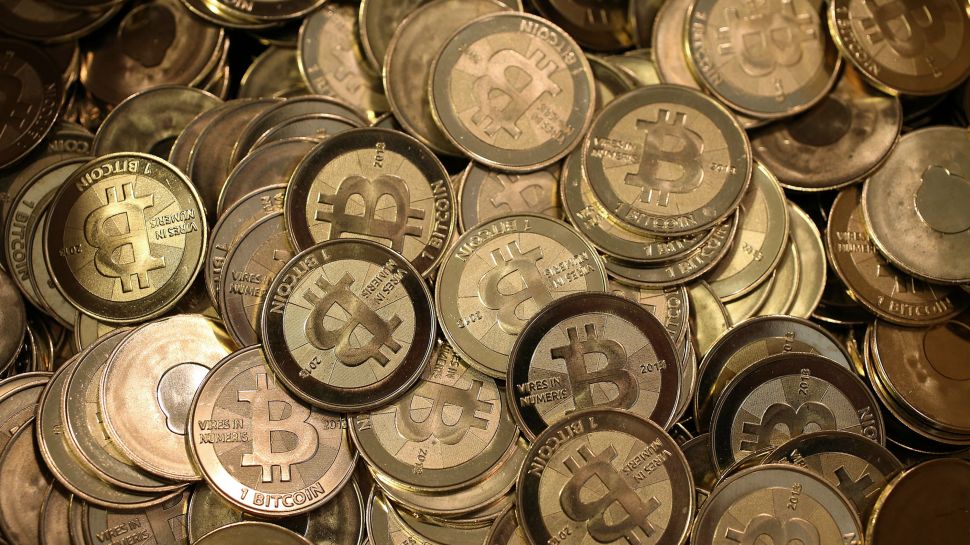
How does Blockchain work?
A blockchain system consists of two types of record, transactions and blocks. Transactions are simply the actions carried out in a particular period, these are stored together in a block.
What makes blockchain more unique is that each block contains the cryptographic hash of the previous one, thus forming a chain. What a cryptographic hash does is take the data from the previous block and transform it into a compact string. Since these strings are impossible to predict it means that any tampering with the chain is easily detected.
This method means that blocks don’t need to have serial numbers, the hash allows them to be uniquely identified as well as verifying their integrity. Each block confirms the validity of the previous one right back to the so called ‘genesis block’ at the start of the chain.
The linking of blocks isn’t the only thing that keeps the chain secure, however. It’s also decentralised, each computer with the software installed has a copy of the blockchain which is constantly updated with new blocks. There is no centralised server holding the transactions and because each new block must meet the requirements of the chain nobody is able to overwrite previous transactions.
Other transaction requirements can be added to define what constitutes a valid entry. In Bitcoin for example a valid transaction has to be digitally signed, it has to spend one or more unspent outputs of previous transactions, and the sum of transaction outputs cannot exceed the sum of input.
What are some of the biggest blockchain databases?
Blockchain has exploded in popularity over the last few years, gaining backers throughout the technology and financial sectors.
Away from Bitcoin, which remains the most well-known and arguably most widely-used network, this has led to a number of alternative blockchains coming to the fore in recent times.
This includes R3, which is developing blockchain-esque technology that can be used by major banking institutions, and in May 2017 raised $107 million in funding from backers such as Intel, HSBC and Bank of America.
Another major player is Hyperledger, an open-source cross-industry collaboration created by the Linux Foundation in order to popularise blockchain-based ledgers, with the first generation of its technology released in July 2017.
All the so-called ‘big four’ accounting firms have also said they are testing blockchain technologies, although so far only Ernst and Young have gone public with their technology, making a digital wallet available to all its Swiss employees.
IBM announced in March 2017 that it will be building its own ‘blockchain as a service’ offering based on Hyperledger, which will allow customers to build secure blockchain networks.
Earlier this year, the London Stock Exchange also revealed it was is set to start using blockchain to improve transparency for shareholding information among unlisted businesses, showing the impact the technology has had.
How secure is blockchain?
Due to its advanced cryptographic protection systems, in theory, blockchain offers a far more secure experience than traditional banking.
The fact that the technology is decentralised, and cannot be retroactively altered or edited makes it ideal for financial transactions and the storing of important information.
Blockchain also benefits from being able to preserve the privacy of the user - however this has unfortunately made it increasingly popular as the payment method of choice for cyber criminals, as a Bitcoin network node doesn’t have to reveal the identity of the person making or receiving payments.
from TechRadar - Internet news https://ift.tt/2Jwy5mt
via IFTTT
Best free web hosting of 2018
Wednesday, July 25, 2018
Blockchain company Tron buys BitTorrent
A blockchain startup named Tron has bought file sharing company BitTorrent for a reported sum of $126 million (about £96 million, AU$170 million).
According to a statement BitTorrent's will continue to operate from Tron's offices in San Francisco, "pursuing its vision for the world’s largest decentralized ecosystem."
Cutting out the middle man
Tron is essentially a decentralized platform for sharing entertainment content, including music and games. By using blockchain and peer-to-peer network technology, it aims to cut out the middle man between content producers and consumers (ie the tech giants like Google and Amazon).
BitTorrent is one of the biggest names in peer-to-peer file sharing, with 100 million users. It was founded in 2004, long before reliable, fast broadband made streaming music and movies feasible, and owns both its own branded torrent client and uTorrent (the latter of which is the most popular client software outside China).
The two clients are free to download, and supported by ads. Last month BitTorrent published a statement to assure users that it wouldn't be changing its business model to enable mining of cryptocurrency – possibly in preparation for its acquisition by Tron, which has its own TRX currency.
Via Engadget
from TechRadar - Internet news https://ift.tt/2JSuzmj
via IFTTT
Mozilla claims Google has made YouTube perform worse on Edge and Firefox
Mozilla's Technical Program Manager has suggested that Google’s recent design refresh of YouTube performs worse on Mozilla Firefox and Microsoft Edge, the two biggest competitors to Google’s own Chrome web browser.
The accusation, which was posted on Twitter, suggests that YouTube’s webpages load five times slower in Firefox and Edge compared to Chrome.
Chris Peterson, the Program Manager who made the claim, suggests that this is down to YouTube’s recent redesign, which uses Google’s Polymer technology.
Unfair advantage?
When it launched the redesign, Google claimed the use of its Polymer library would help with “quicker feature development”. The redesign uses the deprecated Shadow DOM v0 API, which is only available in Chrome.
Cynics will suggest that Google has purposefully done this so that YouTube viewers will use its Chrome web browser (or YouTube app) to get the best experience.
However, others will argue that it’s fair enough that Google makes a service which it owns run better on its own software, using technology that it has designed.
It’s interesting that this issue has been called out by Mozilla, rather than Microsoft. Microsoft uses its own advantages to push Edge, such as having it come pre-installed with Windows 10. Google has yet to comment.
Meanwhile, Peterson offers some suggestions to Firefox and Edge users on how to get better YouTube performance. There's a Firefox extension called YouTube Classic, which reverts YouTube to its pre-Polymer design, while Edge users can use the Tampermonkey extension.
- Check out our pick for the best web browser in 2018
Via Neowin
from TechRadar - Internet news https://ift.tt/2v46unf
via IFTTT
Google Docs deploys new AI grammar checker to eradicate your mistakes
Don't write none too good? Your* in luck, because Google has announced a number of updates for its G Suite series of products that will provide users with some AI-powered grammar assistance in Google Docs, among other things.
The Google Docs update, which is rolling out now to members of Google's Early Adopter Program, is said to use machine translation to spot simple grammatical errors and larger sentence structure issues, and will even teach you how to use subordinate clauses correctly.
It's also promised that Google's machine learning will improve and adapt over time in an effort to detect and combat trickier grammar issues.
Thankfully, the AI functionality has been built into Google Docs natively as part of the update, meaning your documents will remain safe and secure.
That's pretty Suite
Along with its changes to Docs, Google has announced that it's bringing Gmail's Smart Reply functionality to Hangouts Chat, allowing you to respond to messages instantly by selecting from a number of short reply suggestions.
Speaking of Gmail, Google has announced that it's bringing Smart Compose to G Suite customers. The feature, which was announced at Google I/O in May, will help autocomplete your emails for you when you're short on time but can't fully get your message across using Smart Reply — think of it like the predictive text functionality used in phones, only with the ability to pull in complete phrases, addresses and more.
And, in an effort to keep its customers safe, Google has introduced a new investigation tool in security center, which will offer "security analytics, actionable insights and best practice recommendations from Google to help you protect your organization, data and users."
Furthering its efforts to improve customer security, Google is also adding support for data regions to G Suite Business and Enterprise customers, meaning organizations will now be able to geographically choose where their data is stored. At present, the only available options are the US and Europe.
*You're
from TechRadar - Internet news https://ift.tt/2OfQgjF
via IFTTT
Tuesday, July 24, 2018
Best shared web hosting of 2018
NOW Broadband summer sale: deals starting from £15 per month or £20 for fibre
I think we can all agree that it's been a terrific summer. The sun, the World Cup, the sun, Love Island, the sun. And it's been really sunny, too. Glorious. And now along comes NOW Broadband to make it even better (yet, alas, not sunnier) by slashing its already cheap broadband deals even lower in its Summer Sale.
"How low!?", we hear you cry? Try a ridiculously cheap £15 per month for standard ADSL broadband, and only £9.99 upfront for delivery of your brand new router.
"But we want super fast internet!", you continue. Well you're in luck, because NOW has also reduced the price of its fibre broadband plan - it's now a mere £20 per month, making it the best fibre broadband deal in the UK.
"What about TV!?" (some people are never satisfied). Well NOW's Summer Sale also includes broadband and TV packages, which means you can pay an £4.99 a month for all the usual freeview channels, an additional 11 entertainment stations and upwards of 300 box sets to binge away on. So that means less than £20 per month if you want to add the NOW Entertainment pass to its standard speed internet.
We have more information on these fantastic broadband deals below, so simply click the link of the deal you like the look of to go through to NOW Broadband's website.
NOW Broadband Summer Sale deals
Best broadband deals
NOW Broadband is very cheap, but you don't have to take our word for it – take a scan through our up-to-the-minute comparison chart below (or on our main broadband deals hub). You'll see all of today's internet prices in the UK, whether you want a cheap broadband only deal or an all-singing all-dancing broadband and TV deal.
from TechRadar - Internet news https://ift.tt/2uM2WXm
via IFTTT
Best Bitcoin wallet
Once you’ve bought Bitcoins (BTC) or other cryptocurrencies via an exchange (like Bitstamp), if you plan to spend your cryptocurrency right away, you can do so directly from the exchange. If you prefer to hang on to your digital assets, you'll need a secure wallet to which you can transfer your virtual coins.
In this guide, we'll explore five of the very best cryptocurrency applications available today for storing your digital wealth. Each of these programs allow you to generate private keys, which you can store safely, rather than trusting an online exchange which can be hacked or go out of business.
All of these clients are known as 'hot' wallets in that by default they're connected to the internet at all times. If you are moving large amounts of Bitcoin, consider creating a 'cold' offline wallet to store your assets (see our guide to creating a secure cold storage Bitcoin wallet).
- We also show you how to mine Bitcoins
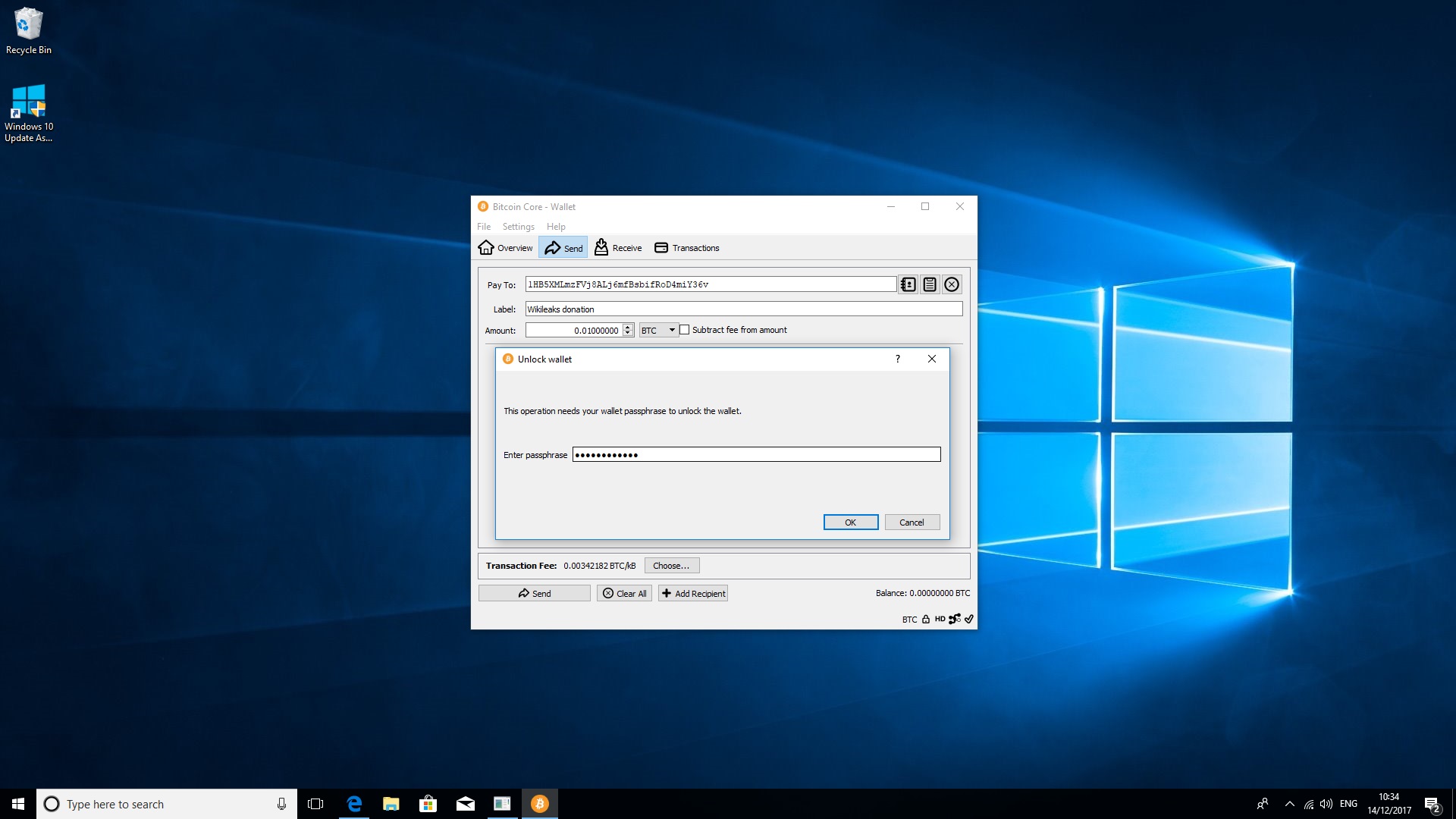
Bitcoin Core is the original BTC client and is available for Windows, Mac and Linux. Core is a 'full node' Bitcoin client, meaning that on first-run it will download the current version of the blockchain (currently around 160GB) by connecting to other nodes. It will then continue to download and process data about Bitcoin transactions.
One advantage of this is that it's much more difficult to link a specific BTC payment address to your identity as Core downloads data about all Bitcoin transactions everywhere. This also protects you against certain types of fraud such as someone trying to spend the same BTC twice, or fooling you into believing you’ve received funds you haven't actually got.
Core comes preconfigured to run through the Tor anonymizing network. This makes it very difficult for anyone to link sending or receiving BTC to your home IP address, ensuring your privacy. All this requires huge amounts of bandwidth – Core must be connected to the internet every day to stay in sync with the network.
On first launch, Core will create a wallet file (wallet.dat) containing your private keys. By default anyone can access it, but you can encrypt the wallet with a password if you wish. (We’ve got a handy guide on setting up Bitcoin Core).
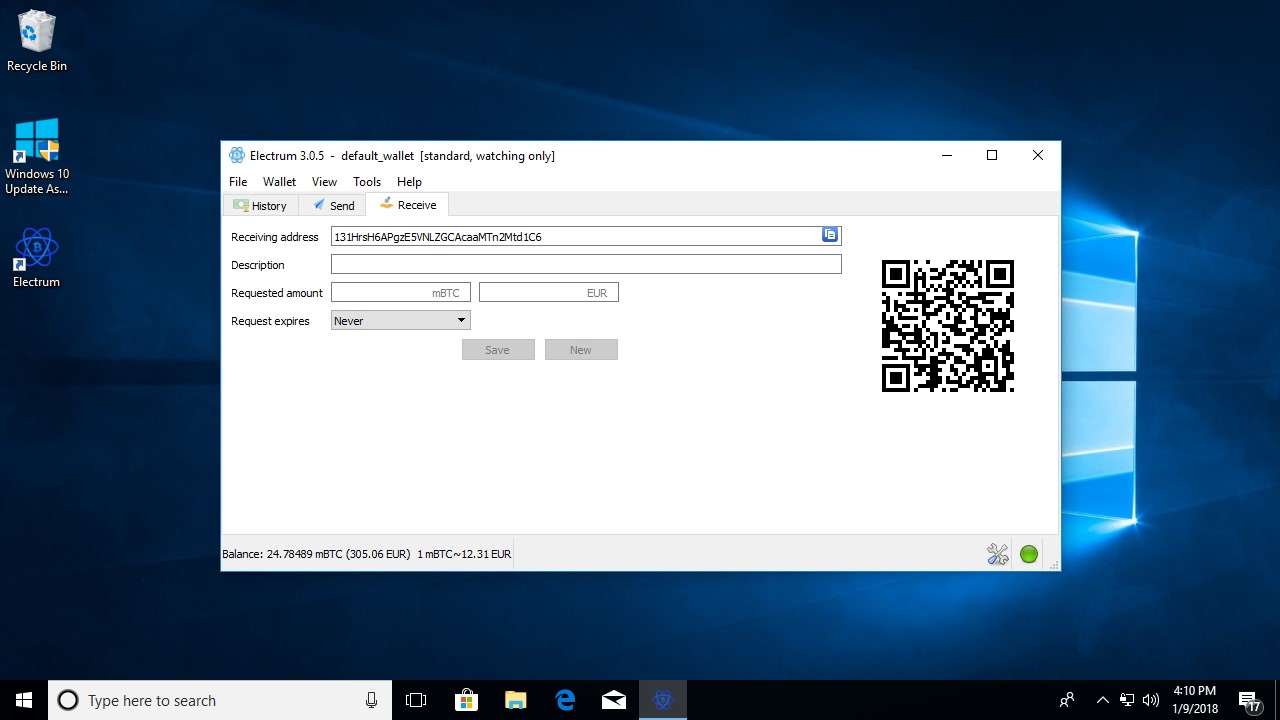
Electrum has been around since 2011 and works with Windows, Mac, Linux and Android. It's one of the most popular 'thin' wallet clients, in that instead of downloading the entire Bitcoin blockchain, it connects securely to other servers to verify your BTC balance and process payments. This means you can set it up in minutes and it takes up very little space on your hard drive.
Electrum uses a 'hierarchical deterministic wallet', in that when you first launch the program it generates a random 'seed' of 12 dictionary words, from which it derives the keys necessary to spend and receive BTC. Electrum displays the seed as you create your wallet and requires you to write it down. This means that if you lose access to this version of Electrum, you can easily reinstall it on another machine and use the seed to restore your BTC.
Unlike the Bitcoin Core client, Electrum offers you the option to encrypt your wallet file during setup, although you can choose to leave it unencrypted if you wish. You can also use Electrum in 'cold storage' mode to create a 'watching only' wallet. This allows you to receive Bitcoin payments and see your balance, but not spend the coins, which may be useful if you're buying BTC as a long-term investment.
As a 'thin’ client, Electrum relies on other servers for payment information, making it more vulnerable to certain types of hacking than 'full nodes' such as Bitcoin Core. See here for more information about how Electrum tries to protect you from this.
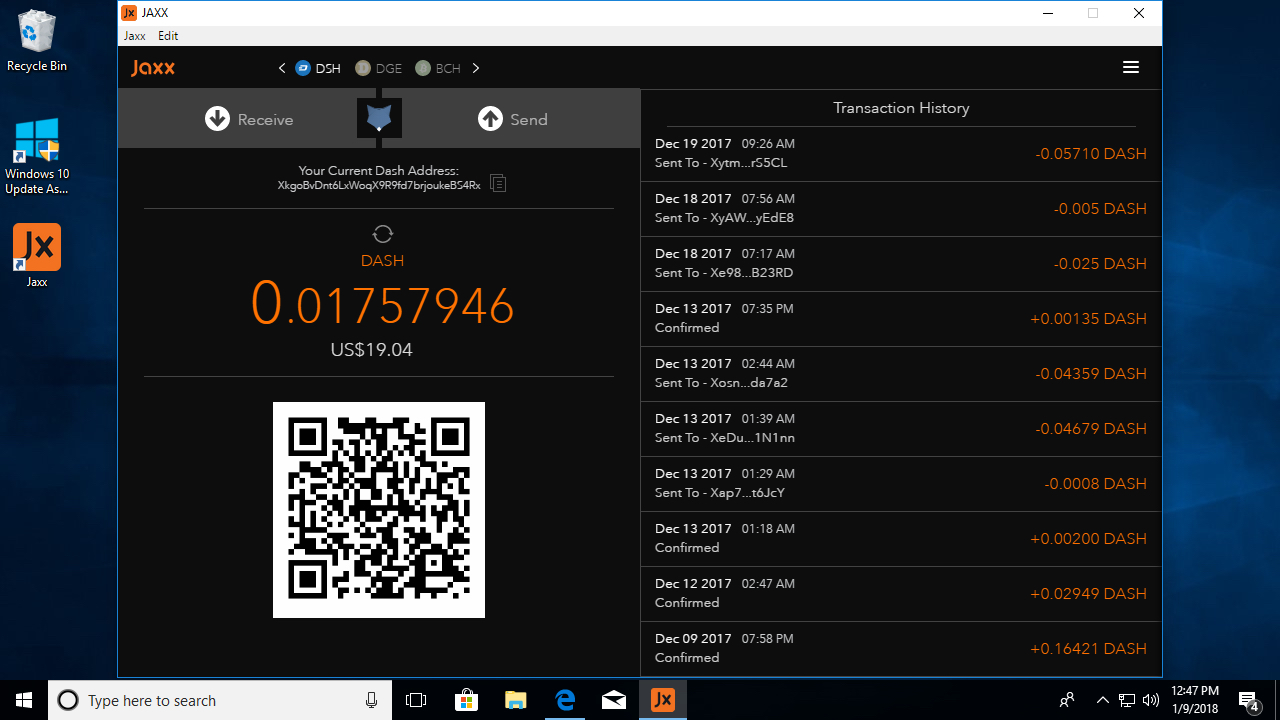
Jaxx was first developed in 2014 and serves not only as a Bitcoin wallet but an app which can store multiple cryptocurrencies such as Litecoin, Dash, Ethereum and Bitcoin Cash. Ripple is not currently supported but the Jaxx team have hinted they may support this feature in the future. (For a full list of supported currencies see here).
When first run, Jaxx displays a 12 word 'master seed' similar to Electrum which you can write down and use to restore your wallets if you lose access to the original program.
The interface is deceptively simple in that you can quickly and easily switch between wallet balances. Jaxx has also integrated Shapeshift support. This functions as a built-in currency exchange, allowing you to quickly exchange crypto balances, for instance to convert DASH to BTC. You can view your updated balances as soon as processing is complete.
Jaxx is available as a Chrome extension as well as for Windows, Mac and Linux. There's even a mobile app (both for Android and iOS), so it's likely you can view all crypto balances from a single device. A new improved version is also available, called Jaxx Liberty, but it's in beta phase, although you can still use it if you wish.
The software is closed source, however, so cannot be reviewed by the community in order to hunt for security bugs. Note that one such bug was discovered in June 2017 which allows someone with access to your machine to extract your master seed and steal your coins. Until this is fixed we recommend using Jaxx only for storing and exchanging small amounts, although on July 1st 2018, Jaxx released a new version called Jaxx Liberty, so the bug might be fixed.
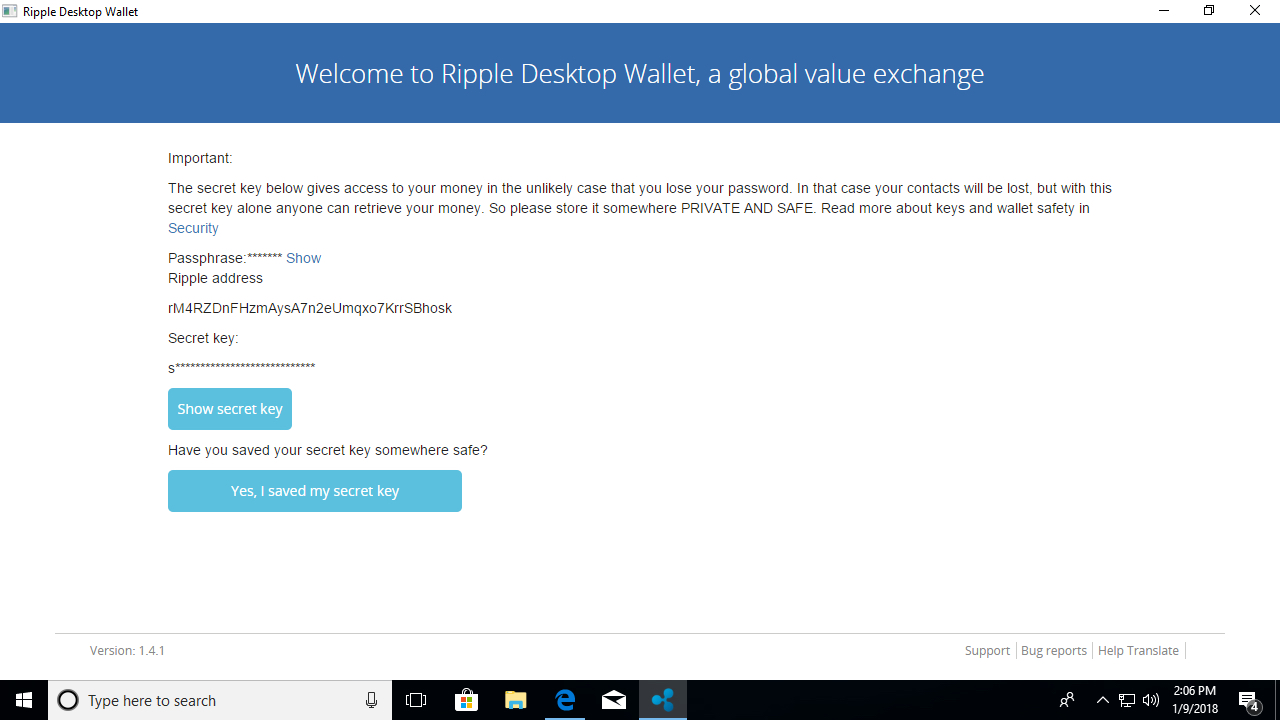
Update: service closed
Ripple is one of the top five cryptocurrencies in terms of capitalization and although it was designed to facilitate transactions between banks, many individuals also use it for speculation and to make payments.
Unlike more popular currencies like Bitcoin, the official desktop client is no longer maintained by the original creators. Fortunately the community has continued to maintain it in the form of Rippex.
Aside from being seemingly the only desktop client available for Ripple, Rippex is very easy to set up. On first-run it generates a 'secret key' which you can write down to restore your wallet in case anything happens to it. The client also requires you to encrypt your wallet file with a password, making your money harder to steal.
In order to activate your wallet you have to pay a fee of 20 XRP (around $43 at current exchange rates, which is about £32). Once you've done this, you can set up a 'cold' offline wallet if you prefer to store your secret keys offline for safety reasons.
If you want to store your XRP outside an exchange but don't want to pay the fee for Rippex, you can also generate a paper wallet instead from http://ripplepaperwallet.com. The website will load the necessary code into your web browser – be sure to disconnect from the internet before creating the wallet.
Rippex is available for Windows, Mac and Linux.
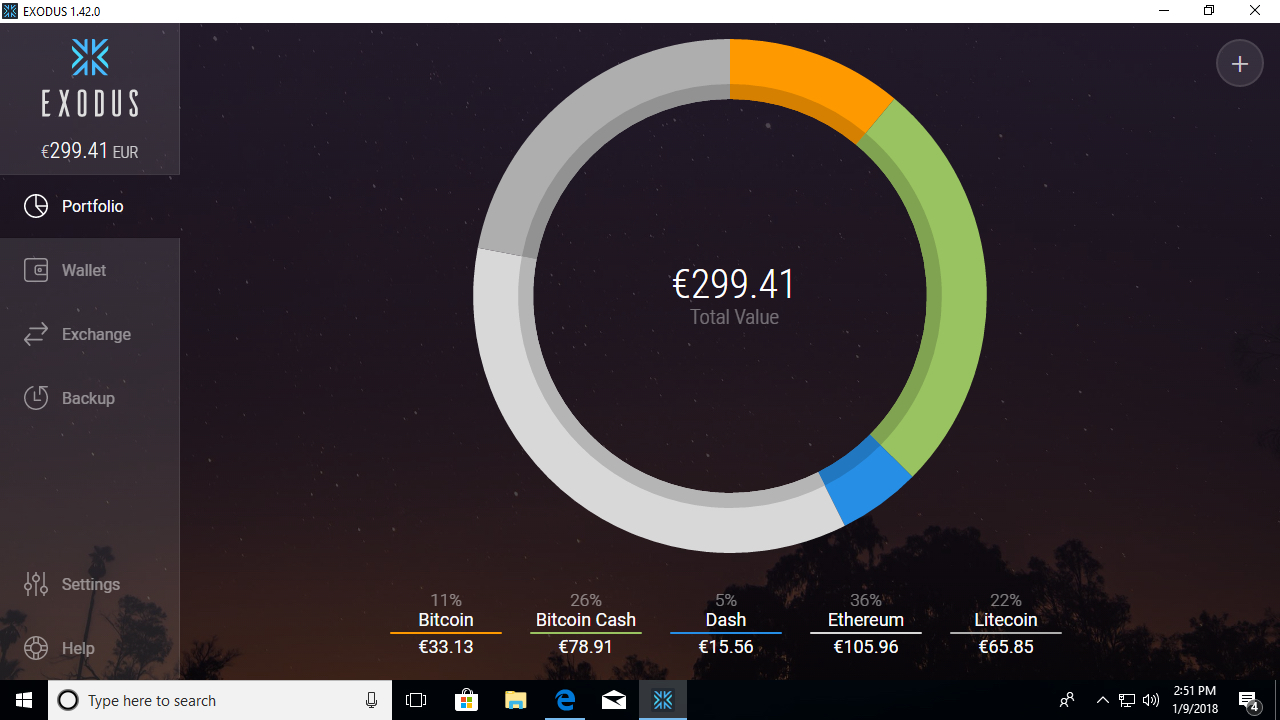
Exodus is a multi-currency wallet and can hold various types of coins and assets. The setup process is very simple. Like Jaxx, you create a 12 word 'master seed' which you can write down and use to restore your wallet if you're no longer able to access the original. (Incidentally, if you've previously created a master seed using Jaxx, Exodus can restore these too). Once setup is complete, Exodus will also prompt you to choose a password to protect your wallet.
Your digital assets are shown in a user-friendly pie chart. Unlike the other wallets we've discussed here, you can also choose different 'skins' to make your client easier on the eye. Use the localization settings to change the default currency (USD) to your home currency if necessary.
The wallet software also supports exchanging crypto-assets and currencies using Shapeshift, and even lists the percentages of assets you hold as part of your 'portfolio'. Sadly Dogecoin is no longer supported.
Exodus is also not 100% open source. The company claims on its website that doing so would give away trade secrets and make it easier for hackers to create bootleg versions of its wallets. In light of this, if you use Exodus you'll have to trust that there are no undisclosed security bugs or backdoors built into the software.
- We’ve also picked out the best graphics cards for mining Bitcoin, Ethereum and more
from TechRadar - Internet news https://ift.tt/2DwDPLd
via IFTTT

